#not really interested in a story where the villain wins
Text
literal years of my life loving nanami and higuruma, and for what.
#higuruma hiromi#nanami kento#jjk spoilers#jjk 247#i dont care!#im done!#ive had enough!#im playing in my space and i do NOT care about what happens from this point like my god.#miwa maki and utahime are completely ignored#yuji is suffering because...... idk.#its not building his character any further im not sure what the point is#not really interested in a story where the villain wins#theres so much lost in throwing away nanami and higuruma#and as much as I hate to say it#gojo should still be alive and completely unable to use cursed energy#or he should have had a moment of verbally passing the baton#nobara was wasted#I assume megumi will die too#i have really lost interest#i will still have fun with the characters but a story where you cannot follow the point or motivations when its almost over#and the villain is still an underdeveloped indestructible foe is not particularly creative#kind of difficult to get invested in a story that feels actively hostile to the reader#:/#i assume every character will die but sukuna who may kill himself out of boredom in the end#not readinf anymkre ive had enough#if i find out maki came back just to channel toji or something it really will be the most depressing end to a story full of potential
72 notes
·
View notes
Text
5 Tips for Creating Intimidating Antagonists
Antagonists, whether people, the world, an object, or something else are integral to giving your story stakes and enough conflict to challenge your character enough to change them. Today I’m just going to focus on people antagonists because they are the easiest to do this with!
1. Your antagonist is still a character
While sure, antagonists exist in the story to combat your MC and make their lives and quest difficult, they are still characters in the story—they are still people in the world.
Antagonists lacking in this humanity may land flat or uninteresting, and it’s more likely they’ll fall into trope territory.
You should treat your antagonists like any other character. They should have goals, objectives, flaws, backstories, etc. (check out my character creation stuff here). They may even go through their own character arc, even if that doesn’t necessarily lead them to the ‘good’ side.
Really effective antagonists are human enough for us to see ourselves in them—in another universe, we could even be them.
2. They’re… antagonistic
There’s two types of antagonist. Type A and Type B. Type A antagonist’s have a goal that is opposite the MC’s. Type B’s goal is the same as the MC’s, but their objectives contradict each other.
For example, in Type A, your MC wants to win the contest, your antagonist wants them to lose.
In Type B, your MC wants to win the contest, and your antagonist wants to win the same contest. They can’t both win, so the way they get to their goal goes against each other.
A is where you get your Draco Malfoy’s, other school bullies, or President Snow’s (they don’t necessarily want what the MC does, they just don’t want them to have it.)
B is where you get the other Hunger Games contestants, or any adventure movie where the villain wants the secret treasure that the MCs are also hunting down. They want the same thing.
3. They have well-formed motivations
While we as the writers know that your antagonist was conceptualized to get in the way of the MC, they don’t know that. To them, they exist separate from the MC, and have their own reasons for doing what they do.
In Type A antagonists, whatever the MC wants would be bad for them in some way—so they can’t let them have it. For example, your MC wants to destroy Amazon, Jeff Bezos wants them not to do that. Why not? He wants to continue making money. To him, the MC getting what they want would take away something he has.
Other motivations could be: MC’s success would take away an opportunity they want, lose them power or fame or money or love, it could reveal something harmful about them—harming their reputation. It could even, in some cases, cause them physical harm.
This doesn’t necessarily have to be true, but the antagonist has to believe it’s true. Such as, if MC wins the competition, my wife will leave me for them. Maybe she absolutely wouldn’t, but your antagonist isn’t going to take that chance anyway.
In Type B antagonists, they want the same thing as the MC. In this case, their motivations could be literally anything. They want to win the competition to have enough money to save their family farm, or to prove to their family that they can succeed at something, or to bring them fame so that they won’t die a ‘nobody’.
They have a motivation separate from the MC, but that pesky protagonist keeps getting in their way.
4. They have power over the MC
Antagonists that aren’t able to combat the MC very well aren’t very interesting. Their job is to set the MC back, so they should be able to impact their journey and lives. They need some sort of advantage, privilege, or power over the MC.
President Snow has armies and the force of his system to squash Katniss. She’s able to survive through political tension and her own army of rebels, but he looms an incredibly formidable foe.
Your antagonist may be more wealthy, powerful, influential, intelligent, or skilled. They may have more people on their side. They are superior in some way to the protagonist.
5. And sometimes they win
Leading from the last point, your antagonists need wins. They need to get their way sometimes, which means your protagonist has to lose. You can do a bit of a trade off that allows your protagonist to lose enough to make a formidable foe out of their antagonist, but still allows them some progress using Fortunately, Unfortunately.
It goes like… Fortunately, MC gets accepted into the competition. Unfortunately, the antagonist convinces the rest of the competitors to hate them. Fortunately, they make one friend. Unfortunately, their first entry into the competition gets sabotaged. Fortunately, they make it through the first round anyway, etc. etc.
An antagonist that doesn’t do any antagonizing isn’t very interesting, and is completely pointless in their purpose to heighten stakes and create conflict for your protagonist to overcome. We’ll probably be talking about antagonists more soon!
Anything I missed?
#writing#creative writing#writers#screenwriting#writing inspiration#writing community#filmmaking#books#film#writing advice#antagonists#villains#writing antagonists#5 tips for creating intimidating antagonists
2K notes
·
View notes
Note
I’ve seen you said you take prompts, so, I had an idea if you’re interested.
So, imagine Danny has an assignment from Clockwork, and as punishment for a prank he pulled where he messed with something and unintentionally pulled CW’s attention away from the timelines for long enough for the Flash to accidentally ruin the timeline, after the timeline was fixed Danny’s forced to go and fix every single broken clock in the solar system. This includes stuff like watches and the batcave clock, maybe a few timed bombs, something on the watchtower, villain bases, etc.. Everyone is extremely confused and concerned as to how and why this eldritch kid with the Mark of Kronos is appearing randomly in their secret bases. Danny isn’t just fixing the clocks, sometimes he pulls Shenanigans depending on where he has to go. If he sees clones in a lab, he’ll call up Dani and they’ll pull off a heist together and she’ll take care of teaching and raising them afterwards. Talons? Danny opens a portal to a section of the infinite realms and gives them their own island after having the yetis go through deprogramming with them and stuff. He sees some stuffy fruitloop batcave? Graffiti and glitter. Lazarus pits? Free smoothie! Of course, he’s respectful to civilians when he bumps into them, giving little unmeltable ice statues to kids, helping people who need it, etc. He fixes a family heirloom watch, bringing tears to a grandson’s eyes. He’s helping people while on his mission, while also messing with any fruitloops he finds. So all of these people around the world are just really confused and being like, what in the world, who/what is this kid?! And sharing stories about him online, painting him as a cryptid or god or whatever. The Justice League and the villains are just Concerned because the kid feels like Kronos, time, and death energy, and have no idea what he’s trying to accomplish. Maybe they think that working clocks give him power, idk, just thinking of the conspiracy boards about Danny as he goes through his punishment and fixes every single clock, including on other planets (Danny practically squealing the whole time as he meets *aliens* in *space*! What cool technology and life!) This is meant to be a punishment but Danny’s living out his dreams. Sure it’s boring at times, but all this traveling is interesting and can help him bond with Dani, so this isn’t much of a punishment for him. He gets to be mischievous and help people out, it’s a win-win. Meanwhile everyone else is thinking that the end of the world is coming and that Kronos has been reborn and is trying to take over the world somehow with clocks.
If you’re willing to expand or add to this or make it your own, please do!
I love the idea of Danny just *poof* "Yes, hello, I am the clock-smith" in the middle of, say, the watch tower. Floating up to the clock wall to adjust the time while pulling out a manual on time zones in different parts of space. The watch tower is within Earth's intergalactic waters per se, but which Earth time did he set it to???
Should he anchor it to one place or just place a spell on it to show all the time zones in a cycle? Does Clockwork have a procedure for this?
Meanwhile, all the heroes in the cafeteria are jumping to their feet, some whispering, "A fifth dimension imp!" and others yelling, "It's Kronos!"
Wonder Woman kneeling before the flouting teen does not help these accusations, as she loudly proclaims, "It's an honor to be of service, Lord Kronos."
Danny looked down at her. "Oh hey, an Amazonian."
"Why have you graced us with your presence? Is there anything this lowly servant can help you with?"
".....Can you gather all the watches for me?"
"At once!" And that's how the rest of the heroes almost have heart attacks because Wonder Woman herself is rushing at them at terrifying speed to rip away any form of watch from their bodies. She's on a war path, and no one can stop her. They can see it in her eyes- she'll draw blood if she has to.
They hand over their watches without much of a fight, feeling like they are being mugged. Wonder Woman sprints away to the next few levels- the screams of fellow heroes echoing in her wake.
Batman isn't as willing to cooperate with Kronos until he knows why the god is here, but Danny doesn't give him much of a choice. Mostly because he is uncontainable. Thankfully, he seems fixated on watches (Bruce writes in his notes, "Can gods be autistic???), and he leaves once they are all fixed.
He changes everything to be precisely twenty-nine hours ahead of whatever time they originally were at. Wonder Woman basically barked at everyone to not switch them back, banishing her sword.
From there, Batman does research with his sons and daughters. Tim finds the information of Danny appearing throughout history to fix watches, and Hal finds similar historical text in Oa's archives—usually right before a horrible tragedy. Further investigation shows a horrendous discovery.
Danny adds or subtracts the same number of hours from the told time as before the tragedy.
He was on Mars three hours before the tipping point of the civil war when the tremendous green Martian massacre happened. He added three hours to the green Martian's capital clock tower.
He was there on Krypton twenty-five hours before the planet was swallowed up by a black hole and exploded. Every public area with any form of time telling was changed to twenty-five regardless of whether it matched the planet's time zone.
And now he was here in the clock tower.
Bruce realizes that they have only one hour left, so he commands everyone to rush about and search for what could be the issue. It's only thanks to the Speedsters' quickness that they find the malfunction in the tower's core—the thing keeping them flouting. Had they been one hour too late, it would have caused the Tower to get pulled into Earth's gravitational pull.
Leading to them crashing into Earth- right above the most populated country of the world, possibly killing millions and leaving the world without their heroes.
The tragedy is avoided but now everyone is weary of when or where Kronos will appear.
Meanwhile, Clockwork is watching the timeline, amused that they think Danny is him when, in reality, Danny is just picking a random time and sticking the clocks to match since it's less math.
#dcxdpdabbles#dcxdp crossover#Kronos' warning#A idea to your idea#I like the idea of Danny just being a clock smith and everyone going "A PROPHECY!?
656 notes
·
View notes
Text

Are You Satisfied?
As you might have heard chapter 236 of Jujutsu Kaisen ends with the death of Gojo Satoru. The fandom is making a pretty big deal about it. As someone who predicted from the beginning that Gojo was going to lose against Sukuna, the reaction is fascinating to me. This is perhaps the most controversial chapter of Jujutsu Kaisen I've ever seen. So I've decided to throw my hat into the ring.
The central theme of Jujutsu Kaisen is death, so the death of one of the main characters isn't too surprising, but what does Gojo's death mean for the story? What does it say about his character?
As I said above I am a little bit shocked by the extreme controversy over Gojo's death. Gojo was never going to win the fight in the first place, because Jujutsu Kaisen is a story and the story would be over if he defeated Sukuna. He'd easily be able to take care of Kenjaku afterwards and the main conflcit would be resolved. Would it really be an interesting story if Gojo one shotted the villains while the kids just wathced on Television?
The story is also not about Gojo, it's about the students. Gojo may think he's the protagonist of reality but he's not the protagonist of the story.
Once again, Jujutsu Kaisen is a story and stories have themes. We may grow personally attached to characters, but characters are just narrative tools to convey the themes of a story, no different from prose, dialogue, and art. Characters are a tool to be used well or used poorly, and sometimes yes that means killing them. Whether Gojo's death was naratively satisfying though isn't the purpose of this post though we're only asking what does it mean?
Finally, Jujutsu Kaisen is not only a fictional story, it's specifically a tragedy. Full disclosure, it's a manga about death.
The Protagonist of a Tragedy
So, number one shout out to me for making this post 4 months ago where I called the way Gojo would end the fight.


Excuse me while I fist pump for calling it!
The question on everyone's minds is why does one of the most powerful characters in the manga die offscreen in a pretty humiliating way, cut in half and helpless on the ground just like Kaneki. The reason Gojo didn't get a more heroic (or cooler) death is because we're not reading My Hero Academia, this is not a story about heroes or even a typical Shonen manga it is a tragedy.
In poetics Aristotle defines tragedy as:
"an imitation of an action that is serious, complete, and of a certain magnitude; in language embellished with each kind of artistic ornament, the several kinds being found in separate parts of the play; in the form of action, not of narrative; through pity and fear effecting the proper purgation of these emotions" (51).
To paraphrase a tragedy is about human action, actions characters make in a tragedy often have dire consequences. One of the most common consequences if the reversal of a hero's fortune, a hero of a tragedy usually starts out on top and ends up on the bottom because of the bad choices they make. If in normal shonen manga characters overcome their flaws through effort and persistence, in Jujutsu Kaisen we see characters more often than not lose to their flaws.
The reason I posted that Kaneki panel specifically is because it was a brilliant moment of narrative punishment for Kaneki's central character flaw. Kaneki the hero's main flaw is that he always fights alone, and he constantly makes that same choice over and over again to fight alone. One of the characters helpfully explains it as well.

Stories are primarily about change. If a character doesn't change they're not serving the plot, unless that specifically is the point. People have pointed out how abrupt it is for Gojo to get sealed in Shibuya, get let out, and then immediately die afterwards but that's kind of the point. Gojo made more or less the exact same choice (he asked for Utahime's help for a buff but otherwise fought the entire battle himself). The definition of insanity and what not, why would doing the same thing over and over again net him a different result?

Not only did Gojo choose to fight alone, but as I've been hammering on and on about in previous meta the entire fight Gojo cared more about fighting a strong opponent then he did saving Megumi, the child he was responsible for.
Jujutsu Kaisen is not a typical shonen manga where everything is resolved by beating a strong villain in a fight. That's specifically why I used the Tokyo Ghoul reference, because the reason Kaneki is defeated offscreen like that is because he thought the world worked like a shonen manga. He has a fantasy sequence where he's fighting Juzo in a shonen battle tournament like this is Yu Yu Hakusho right before it snaps back to reality and he's limbless on the ground.
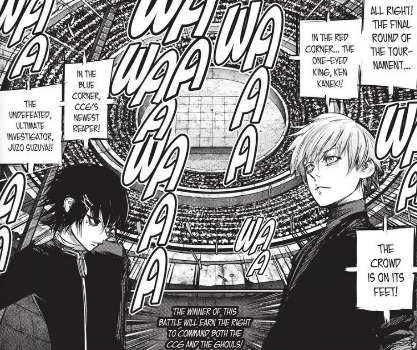
Gojo is a major character in the manga Jujutsu Kaisen, literally "Sorcery Fight" and he is the best sorcerer in the whole world. His entire identity revolves around being a sorcerer. Since he is so good and beloved at what he does, he thinks that everything is resolved by exorcising a curse or defeating a strong opponent. He has basically no identity outside of that. Which is why when he's fighting the possessed body of his student, a person he's been mentoring since childhood his priority is not to save Megumi but to beat a strong opponent. Gojo is a sorcerer, before a human being. That's who he is, that's who he always has been since day one.
I think part of the negative fan reaction comes from fans being really attached to this scene in the manga and deciding Gojo's entire character revolves around being a good mentor figure to children.

Which is just incorrect, Gojo's entire character revolves around being the strongest. On top of that though, Gojo can care about children and also care about being the strongest he can care about multiple things at once and have those things contradict each other because humans are complicated. I'd point out even in this panel where he's stating motivation he's not trying to raise these kids up into being healthy adults, he wants them to be strong Jujutsu Sorcerers. Even when he's raising kids, his intention is to turn them into Jujutsu Sorcerers because everything in Gojo's mind revolves around Jujutsu Sorcery. Gojo does not exist outside of the world of sorcerers. Gojo may be the chosen one but he'd never be able to hold down a job at Mcdonalds.
I think in general readers put more investment in the things characters say out loud, rather than their actions. You can say one thing and do another. I can say "I should never eat sweets again I'm going to improve my diet", and then go and eat ice cream five hours later. Gojo can state out loud his intention to foster children and protect their youths, but then fail to properly do that in the story. Characters are not always what they say they are, that's why they're interesting to interpret. This isn't me calling the readers stupid, just pointing out that Gojo is made up of contradictions. He wants to get rid of the old guard and replace them with something new, but Gojo IS THE OLD GUARD.
If the culling games arc has shown us one thing, it's that ancient sorcerers brought to the modern age do not care that much about human life on an individual level, they are all of them egoists. There's a reason Gojo resembles someone like Sukuna more than he does any other character in the manga. I'm not saying Gojo is exactly like Sukuna, he's far more altruistic and uses his genuinely noble ideals but at the same time Sukuna is a shadow archetype to Gojo he represents Gojo's flaws. The flaws that Gojo succumbs to in tragic fashion.
Which if you believe that Gojo genuinely does love his students, and the ideal he's fighting for is to raise up a better generation and allow them to live out their youths, then Gojo throughout the entire Sukuna fight is acting against those ideals. He cares far more about fighting Sukuna then he does saving Megumi, it's shown over and over again in the battle, Megumi is an afterthought to him. If Gojo care moredefeating the big bad and saving the world is more important than helping a child that Gojo is responsible for then Gojo is acting against his stated principles. Why should Gojo win the fight when he's fighting for all the wrong reasons?
Tragedies are like visual novels, if you make the wrong choice the novel will give you a red flag. If you ignore the red flag then you get locked into the route with the bad ending. Gojo always fights alone. Gojo only ever fights for himself, even if he's using that selfishness in support of a more noble ideal like creating a better generation of sorcerers. If Gojo consecutively makes the same changes then in a tragedy he's not going to be rewarded for it.
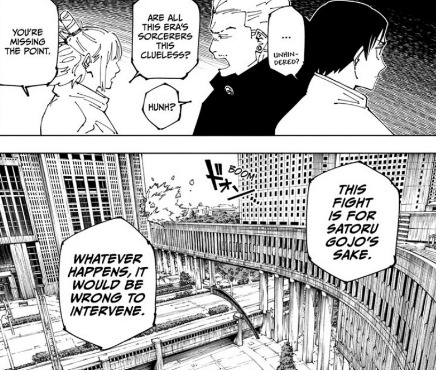
Gojo wants the old generation out and the new generation in, but Gojo resembles the old generation too much. Old sorcerers like Hajime and Sukuna respect him, Hajime argues that Gojo being able to fight for his pride is far more important than him living to the end of the battle when Yuta wanted to interfere and help him.
Gojo's death isn't a surprise curve ball that Gege is throwing us for shock value, it's a result of his choices throughout the manga. A manga about change, and the change between generations is not going to punish a character for remaining roughly the same. Of course you might find it disappointing that Gege didn't give Gojo the chance to grow and change and experience a character arc like Megumi or Yuji, but Jujutsu Kaisen is a tragedy, and the way Gojo's arc ended is consistent with what Gege wrote.

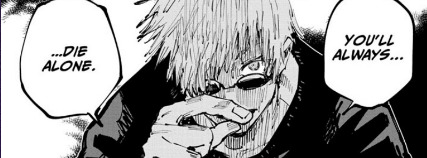
Jujutsu Kaisen is not just a tragedy though, it's a manga about death. The manga begins with Yuji's grandfather warning him not to die alone the way that he did. His grandfather's dying words are what motivate Yuji throughout the beginning of the manga as he's searching for a "proper" death.
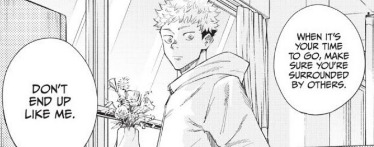
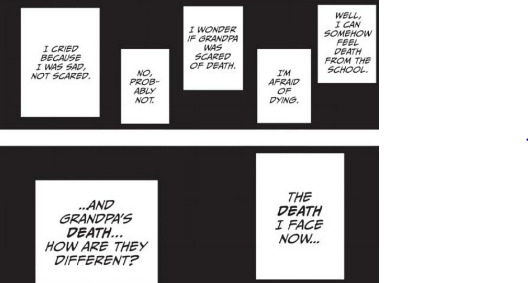

One of the major themes of Yuji's character is a contemplation of death. He accepts that death is inevitable, so he wants to save them from the gruesome deaths they'd experience if they became victims to curses and allow them to have a more satisfying death. Yuji's grandpa died an unsatisfying death because he died alone in a hospital room. Yuji even tries to make his own death a satisfying one because he believes by dying to seal away Sukuna he'll reduce the total number of casualties to curses.
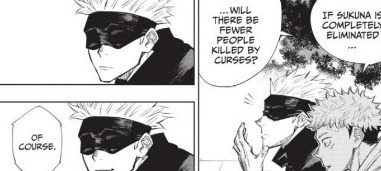
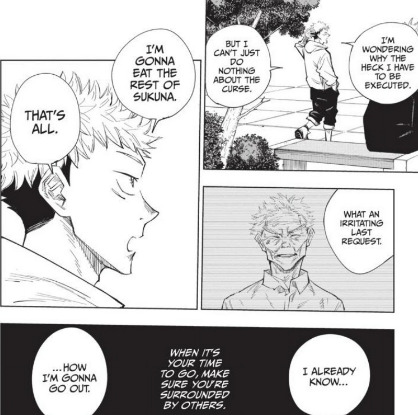
Jujutsu Kaisen keeps investigating the theme of death and what exactly would make for a satisfying death. At one point it's all but stated that death is the mirror that makes humans analyze their lives.
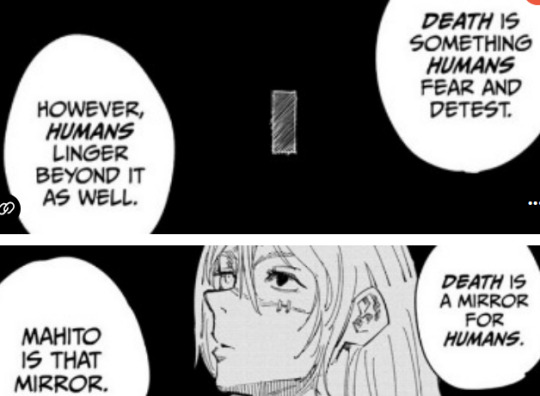
When Yuji fails to save Junpei from the "unnatural death" it calls into question whether or not his goal of saving people from unsatisfying deaths and the gruesome deaths caused by curses is even feasible. Nanami even says that Yuji might not be able to accomplish his goal and warns him away from the path.
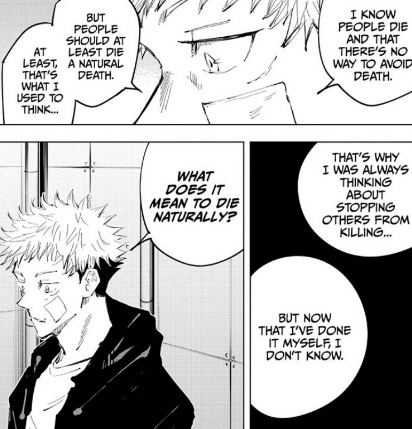
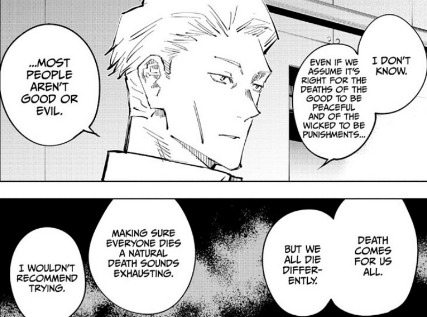
We see repeated unsatifying deaths in the manga, each time someone reflecting on their deaths that they weren't able to get what they wanted out of life. This list comes via @kaibutsushidousha by the way I'm quoting them.
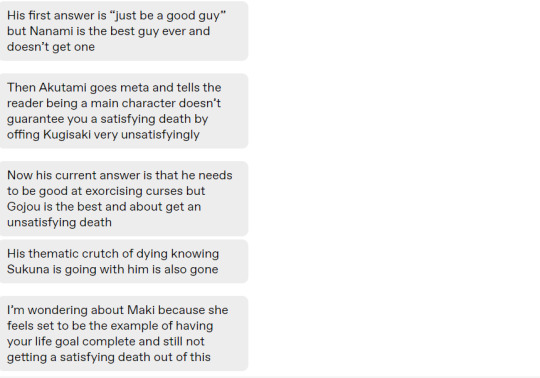
Nanami's a character who chose to work as a sorcerer because he didn't want to evade the responsibility of doing all you can to help people, he wanted to believe he's somewhere where he's needed. He never runs away from responsibility like Mei Mei does so he quite literally works himself to death, living and dying as a sorcerer. Nanami or Gojo's dying hallucination of Nanami even says as much, his death is the result of him choosing to go south and returning to be a sorcerer.
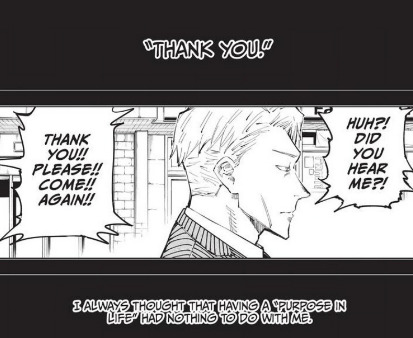
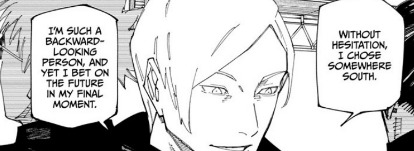
Maki chose revenge against the Zen'in over her sister, and as a result Mai is dead. Maki has all the power in the world now, her revenge complete but she's left with a sense of "now what?" She's as strong as Toji now but she failed to protect her sister, and it's the result of the choices she made. Maki's reflection isn't triumph, it's "I should have chosen to die with her."

Even Yuji himself is robbed of his narrative purpose. The manga began with Yuji saying he wants to choose how he's going to die and he'll die taking out Sukuna with him so he can reduce the number of people killed by curses in the world. Both of those things are thrown in Sukuna's face. Number one the amount of people Yuji can save by permanently killing Sukuna is now a moot point because he let Sukuna rampage in Shibuya.
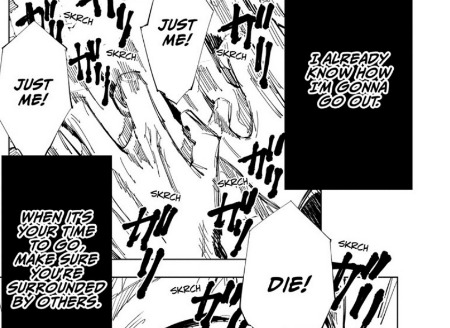
Number two, Sukuna isn't even in Yuji anymore. To build on what Comun said though, this repeated tragedy has a purpose to it and understanding requires understanding that Jujutsu Kaisen is an existentialist manga. Existentialism is basically a school of philosophy centered around the question of "Why do I exist?"
There's nothing about the invetability of death to make you question why you're alive in the first place. In the myth of Sispyhus, Albert Camus boils down all of philosophy to one question.
"There is but one truly serious philosophical problem, and that is suicide. Judging whether life is or is not worth living amounts to answering the fundamental question of philosophy. "
All of philosophy is should I shoot myself in the head or should I keep living? Everything comes after that question, which is why in Jujutsu Kaisen a lot of the characters motivations revolve around them contemplating death. Sorcerers exist in a world where they can die any moment, and as Gojo says most of them die alone. It might be the nature of sorcery itself that causes so many people to die, not only are they dying because they are trapped in an uncaring system, but the characters themselves aren't really attempting to live outside of it. They live and die as sorcerers, replaceable cogs in the machine.
All of these unsatisfying deaths may just be the result of all these characters making one choice, to live as sorcerers rather than people. Because to exist means to live in the world.
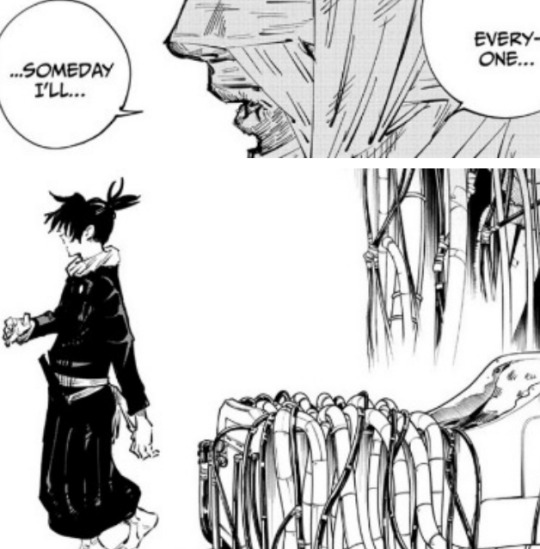

Even in Mechamaru's case, his goal is deeply existentialist by what I defined, all he wants to do is live in the world with everyone else rather than be stuck in his hospital room but his actions contradict that goal. Instead of letting his friends come and visit he's obsessed with the idea of getting a normal body because he feels that's the only way he can exist with everyone else, he makes a deal with the devil, he lies and goes behind their backs. He wasn't living with everyone else in the world and he could have chosen to, he chose wrong and his death is the result of that choice.

Jujutsu Sorcerers aren't living in the world. They're living in a little snowglobe far removed from the world with its own rules, most of them regressive and disconnected from the rest of society. If you define existentialism as just "living in the world' then a lot of these characters aren't, because they only exist in the world of sorcery.
INVISIBLE BUFFY: What are you talking ab-
SPIKE: The only reason you're here, is that you're not here. (drinking) INVISIBLE BUFFY: Right. Of course, as usual there's something wrong with Buffy. She came back all wrong. (moving around on the bed) You know, I didn't ask for this to happen to me.
SPIKE: Not too put off by it though, are you? (drinking) INVISIBLE BUFFY: No! Maybe because for the first time since ... I'm free. She tosses the sheet aside. Spike looks around, trying to figure out where she's going.
INVISIBLE BUFFY: Free of rules and reports ... free of this life.
SPIKE: Free of life? Got another name for that. Dead.
Not living in the world with everyone else is the same as being dead.
A lot of these characters either make the choice to act alone, or be a jujutsu sorcerer rather than a person and because of that they die as sorcerers, b/c sorcerers die that's what they do. Mai didn't want to keep living as a hindrance to Maki so she kills herself. Maki didn't want to be anything other than a sorcerer, so her little sister dies and she's not a big sister anymore. Nanami chose to leave his job behind and become a sorcerer again, he dies as one.
Of course I don't think the manga is punishing characters for being too egotistical, but rather too unbalanced. If anything Mai is too selfless and that is why she died, she didn't want to live for herself and chooses self sacrifice for her sister. An unbalance between selfishness or selflessness results in an underdeveloped ego. Jujutsu Kaisen doesn't punish individualism per se, moreso if you're not a fully developed individual you won't last long. Because it's also a manga about growing up in the world, and a person who doesn't have a healthy, mature, well-balanced sense of self is not a grown up.
This twitter user det_critics points out that Gojo (and also Yuki + Yuji's) failures in the manga can be attributed to the fact they don't have real senses of self.
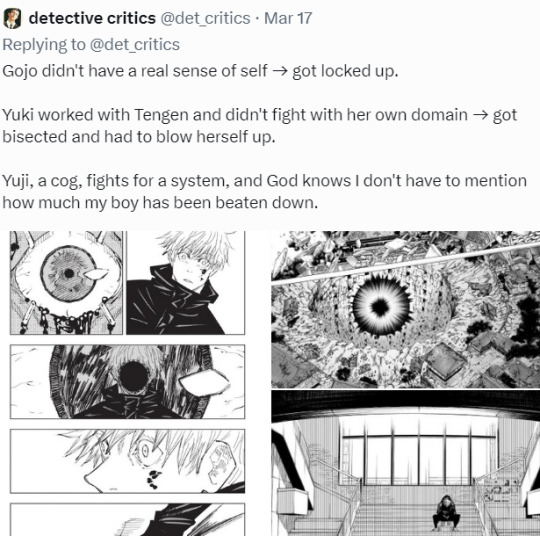
Gojo has an identity crisis as outlined by Geto, "are you Satoru Gojo because you're the strongest, or are you the strongest because you're Satoru Gojo?"
It's a challenge for him to find some reason to live outside of being the strongest, and in tragic fashion Gojo just doesn't find it in time. Gojo lived for fighting others, and proving to himself that he's the strongest, and that's how he dies.
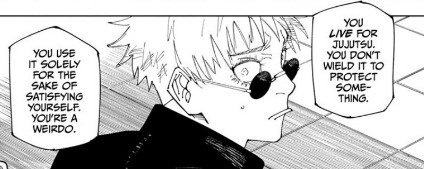
There's something I like to say about narrative punishment in stories. There are two ways to punish a character, you either don't give them what they want, or you give them exactly what they want. This is the latter, Gojo wanted to find someone stronger than him because deep down he believed that nobody could understand him unless they were on his level. He wanted to be surpassed, and that's why he focused on creating stronger young sorcerers, but he never shook himself of the belief that only someone as strong or even stronger than he was could ever be emotionally attached to him so he made a deliberate choice to draw a line between himself and others.
Gojo's essentially gotten what he wanted from that choice in the worst way possible. The student he picked to succeed him Megumi, has his body stolen and kills him. Gojo is surpassed, but it's not by one of his own students it's by an enemy that's not only trying to kill Gojo but is going to massacre his students afterwards.
Gojo's spent his entire life believing that because he's more powerful that makes him inherently different and above others, and being lonely because he himself believed he couldn't relate to ordinary people and he dies like an ordinary person, an unsatisfying death where he wasn't able to bring out Sukuna's best, where he gets unceremoniously cut in half offscreen but yay he's no longer the strongest. He's gotten exactly what he wanted. Megumi is still not saved, Sukuna's probably going to kill more people because Gojo failed to stop him here, but hey at least he stopped to compliment Gojo.
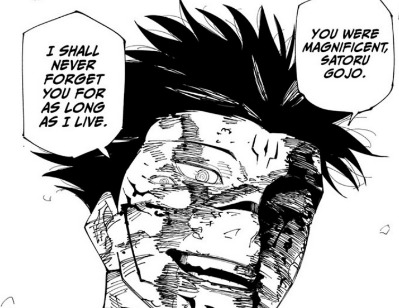
It's empty, but it's empty because of the choices Gojo made in life to just not bother connecting to people or develop any kind of identity besides being a sorcerer. Gojo lives and dies as a sorcerer, and his dying dream is returning to a teenager being surrounded by everyone he was with during his school days, because that's the happiest time in his life. Ironically he was happier before he became the strongest, because that was the only time in his life that he allowed himself to connect to people.
However in the eyes of others, he is someone who has it all. That's why he is always alone. There was no one who could hold the same sentiments and mutually understand him. Geto was the only one who could understand what he was trying to say, and the only one who could communicate well with him.
It's no coincidence Gojo and Geto die exactly a year apart on the same day, if anything I'd say the reasons they die are similiar to at least thematically. They both die because they don't want to live in the world. Geto thinks the world is too corrupt and GOjo doesn't want to be anything other than a sorcerer, both of them fail to adapt.
「 'It's just. . .'
It's just that it was what Geto had to do.
[...] To someone like him, the reality that the world of sorcerers presented to him was just too cruel.
'. . .that in a world like this, I couldn't truly be happy from the bottom of my heart.'」
They can't be happy in a world like this from the bottom of their hearts, so narratively they both die. The things they chose to live for at the end of their life they fail to accomplish, Gojo is no longer the stronget, Geto fails to wipe out mankind or make major changes to the world and they die as normal people unsatisfied because they weren't trying to live in the world and make connections to others. They die almost karmically a year apart because their main connection for both of them, the thing which made them feel connected to the world and other people was each other.
Which is why this panel breaks my heart and is so narratively satisfying because of how unsatisfying it is...
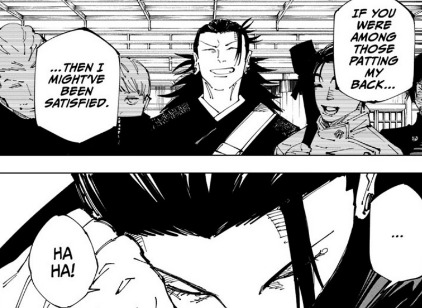
"If you were among those patting my back... then I might've been satisfied."
Gojo reflects that he's not satisfied dying against Sukuna, not because he failed to give him a good enough challenge but because Geto wasn't there to pat him on the back. The one thing that would have satisfied him he couldn't have, because he didn't live to connect to people he lived to be the strongest and he died alone as the strongest. There's just something deeply upsetting about Gojo's dying dream fantasy just him being there talking with all of his dead friends who he never appreciated or connected to properly when he was alive. Knowing that if something had just gone a little differently, that even if he had to die no matter what he could have died happier if Geto was among the people saying goodbye to him because that connection with Geto is what gave his life meaning.
Dazai Osamu: "A life with someone you can say good-bye to is a good life, especially when it hurts so much to say it to them. Am I wrong?"
-Bungou Stray Dogs Beast
#gojo satoru#jjk spoilers#jjk meta#jujutsu kaisen 236 spoilers#jjk 236#jujutsu kaisen 236#jjk 236 spoilers#jujutsu kaisen#jujustu kaisen meta#jujutsu kaisen theory#jujutsu kaisen manga#satoru gojo#geto suguru#suguru geto#satosugu
2K notes
·
View notes
Text
Tomarry au — arrange marriage but with a twist.
Harry Potter wakes up in the body of a villain. A character in an otome game that his goddaughter liked to play. He, being the only one without any kids of his own — always volunteered to take care of her whenever Ron and Hermione finally got some free time together. Thus, they remained really close for years. Even after she grew up she stayed in contact with Harry. And so he knew all about her new obsession.
It was a game where the main character got to choose from six different male leads. They all had their own storyline and apparently it was really popular. It was a story about how this mc, who is a powerful witch — end up winning the heart of the male lead while winning over the kingdom. Because common blood witches/wizards are rare and mostly scorned upon due to not having pure bloodline. And Rose wouldn't stop talking about how interesting it was.
Harry's goddaughter liked everything about the story except one character.
He was the most popular yet the most controversial character; the mad emperor called Voldemort. And there was a reason why he was so popular yet so damned controversial. And no — it was not because of his penchant to torture or order an execution in the bat if an eye. Nope, apparently hot, evil characters tend to be popular anyway, but it mostly was because how no one was able to win his route. Ever.
Voldemort's, or better known as the mad king's — is a route no one ever won. So many people tried, and even begged asked the game developers to give them a hintof how to win his route but apparently they didn't budge and stayed tight lipped about Voldemort's route. Everyone tend to die on his route no matter the choices, no matter what actions you took and no matter how different it was from the last choice. Your character would. just. keep. dying.
But there was one thing that remained common in all of Voldemort's storylines. And it was the main villain. Voldemort's husband. Even when you aren't playing the main game; Voldemort's husband is always trying to make your life hell. So, everytime you win a routine the husband dies a horrible death. Mostly executed by Voldemort himself.
In Voldemort's own route, however — it was different. And how different Harry never got to ask his goddaughter because now he was fucking dead.
And now, here he is. Stuck. In. The. Body. Of. The. Main. Villain. Of. A. game he doesn't even know the name of, for fuck's sake.
Yes, this is a story about how Harry dies and wakes up in the body of a villain who is set up for an arrange marriage with a king who is apparently so hard to win over that even the most likable persons, the main fucking character even — is not able to win him over. So how would, Harry in the body of Harry Evans (they even share the same damn first name, what the fuck.) would win over the husband who's job is to basically kill him after every happy ending? Harry doesn't know.
Cue to Harry doing everything to not die in the hands of Voldemort while trying to figure out how to befriend the mc so he doesn't die due to natural disaster through karma for looking at fate's darling (mc) the wrong way. Also, cue to Harry derailing the plot so hard that the title of the story changes after he is done.
#another isekai plot with tomarry lmao#i love them#i have so many ideas for this au#but other than that#yes it is an otome game au#and you can imagine the 'mc' to be whoever u want#but either ways#follow#harry potter#on this journey of#winning Voldemort over lmaoook#tom riddle#tomarry#harrymort
163 notes
·
View notes
Text
What's New In IF? Issue 5 (2024)
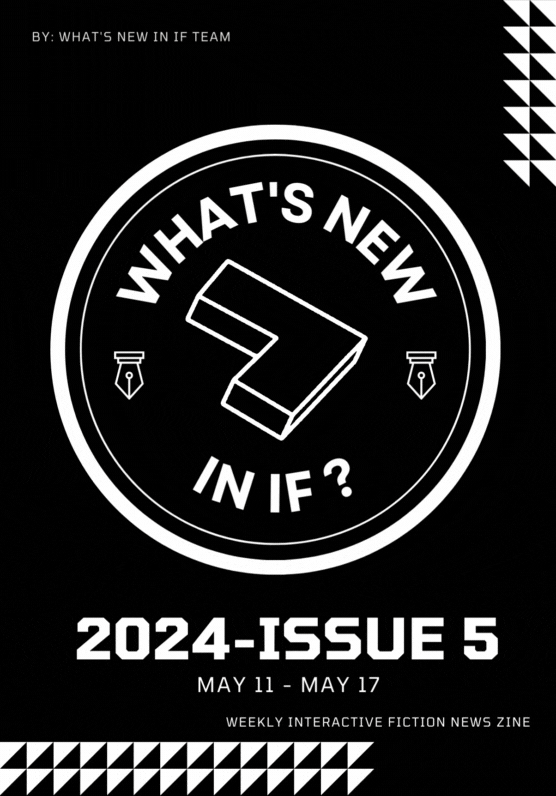
By Erika, Marjorie, Axelle, Zach and Noi
Now Available!
Itch.io - Google Drive - Keep Reading below
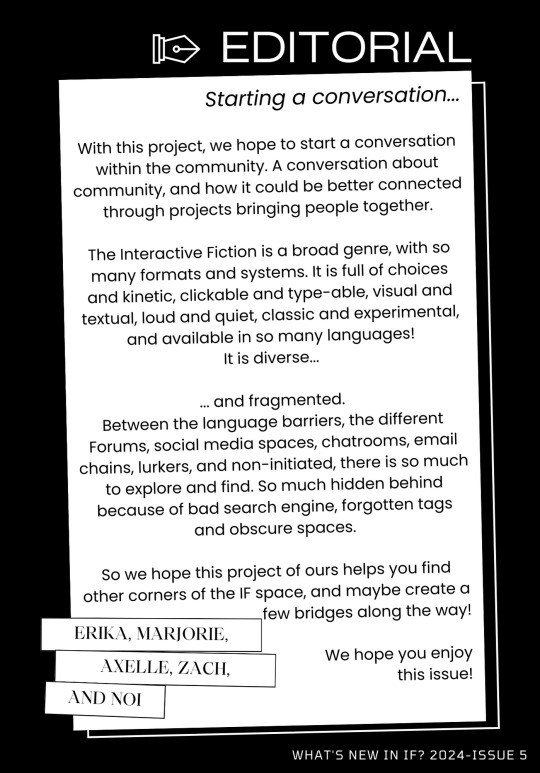
EDITORIAL
Starting a conversation…
With this project, we hope to start a conversation within the community. A conversation about community, and how it could be better connected through projects bringing people together.
The Interactive Fiction is a broad genre, with so many formats and systems. It is full of choices and kinetic, clickable and type-able, visual and textual, loud and quiet, classic and experimental, and available in so many languages!
It is diverse…
… and fragmented.
Between the language barriers, the different Forums, social media spaces, chatrooms, email chains, lurkers, and non-initiated, there is so much to explore and find. So much hidden behind because of bad search engine, forgotten tags and obscure spaces.
So we hope this project of ours helps you find other corners of the IF space, and maybe create a few bridges along the way!
We hope you enjoy this issue!
ERIKA, MARJORIE, AXELLE, ZACH, AND NOI
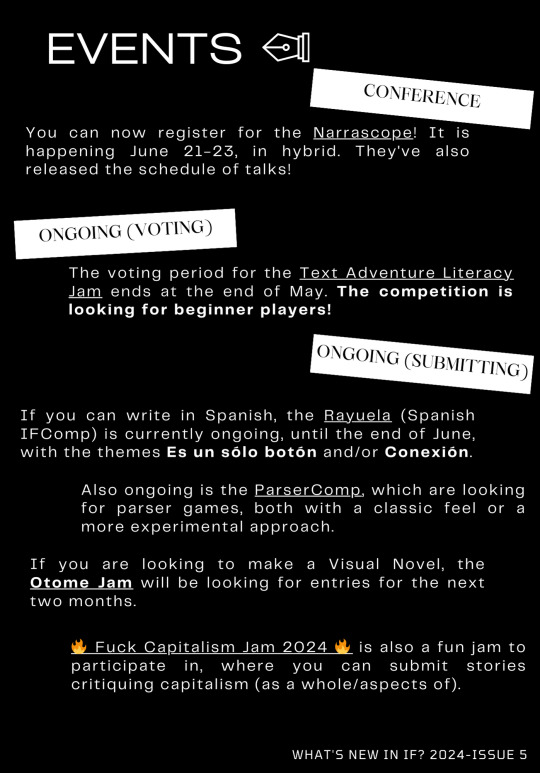
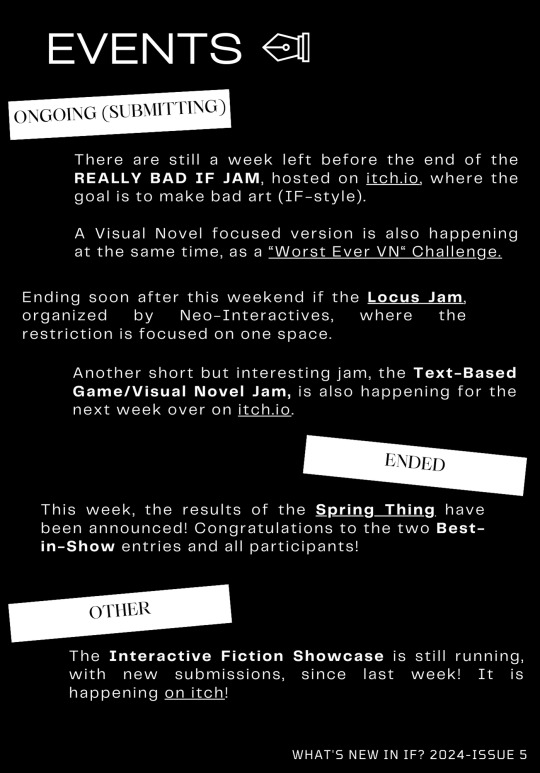
EVENTS
CONFERENCE
You can now register for the Narrascope! It is happening June 21-23, in hybrid. They've also released the schedule of talks!
ONGOING (VOTING)
The voting period for the Text Adventure Literacy Jam ends at the end of May. The competition is looking for beginner players!
ONGOING (SUBMITTING)
If Spanish is in your wheelhouse, the Spanish IFComp (Rayuela) is currently ongoing! You can submit a game until the end of June, with the themes Es un sólo botón and/or Conexión.
Also ongoing is the ParserComp, which are looking for parser games, both with a classic feel or a more experimental approach.
If you are looking to make a Visual Novel, the Otome Jam will be looking for entries for the next two months.
🔥 Fuck Capitalism Jam 2024 🔥 is also a fun jam to participate in, where you can submit stories critiquing capitalism (as a whole/aspects of). (We know it's not technically IF, but they took IF entries before)
There are still a week left before the end of the REALLY BAD IF JAM, hosted on itch.io, where the goal is to make bad art (IF-style).
A Visual Novel focused version is also happening at the same time, as a “Worst Ever VN“ Challenge.
Ending soon after this weekend if the Locus Jam, organized by Neo-Interactives (@neointeractives), where the restriction is focused on one space.
Another short but interesting jam, the Text-Based Game/Visual Novel Jam, is also happening for the next week over on itch.io.
ENDED
This week, the results of the Spring Thing have been announced! Congratulations to the two Best-in-Show entries and all participants!
OTHER
The Interactive Fiction Showcase is still running, with new submissions, since last week! It is happening on itch!
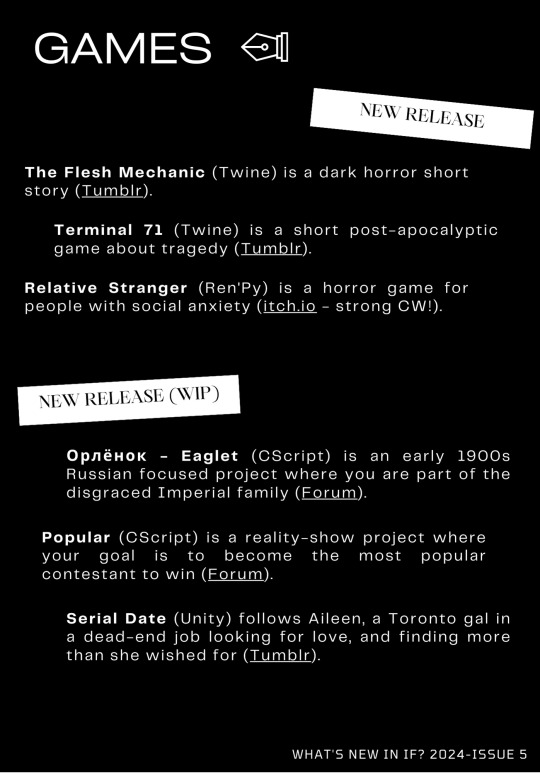
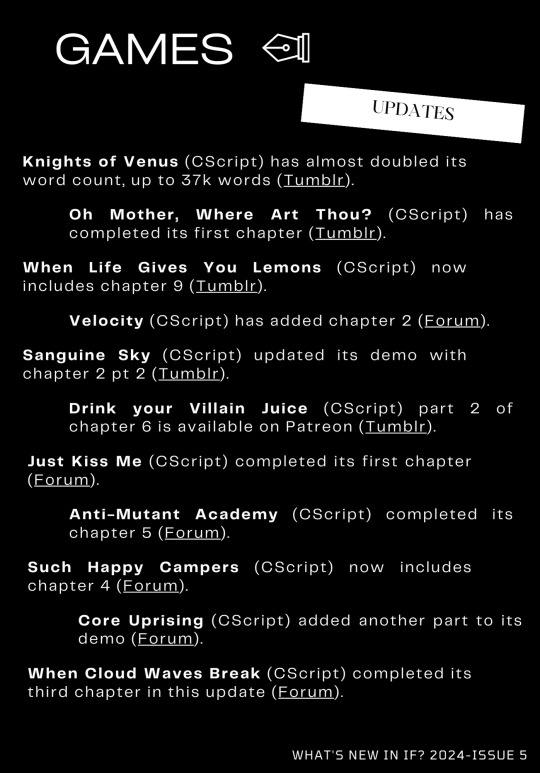
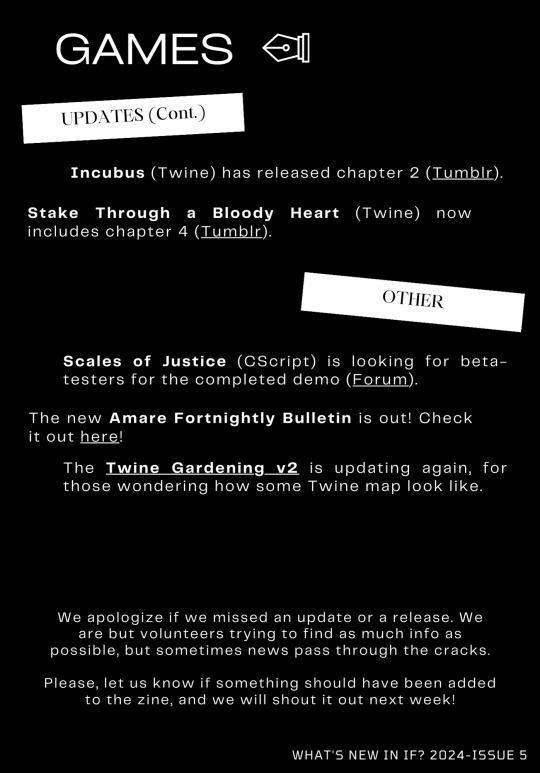
GAMES
NEW RELEASE
The Flesh Mechanic (Twine) is a dark horror short story. (@reachartwork)
Terminal 71 (Twine) is a short post-apocalyptic game about tragedy. (@vagrantclown)
Relative Stranger (Ren'Py) is a horror game for people with social anxiety (strong CW!).
NEW RELEASE (WIP)
Орлёнок - Eaglet (CScript) is an early 1900s Russian focused project where you are part of the disgraced Imperial family. (@himbeereule)
Popular (CScript) is a reality-show project where your goal is to become the most popular contestant to win.
Serial Date (Unity) follows Aileen, a Toronto gal in a dead-end job looking for love, and finding more than she wished for. (@lehxra-arts)
GAMES UPDATES
Knights of Venus (CScript) has almost doubled its word count, up to 37k words. (@knights-of-venus-if)
Oh Mother, Where Art Thou? (CScript) has completed its first chapter. (@ohmotherwhereartthou-if)
When Life Gives You Lemons (CScript) now includes chapter 9. (@when-life-gives-you-lemons-if)
Velocity (CScript) has added chapter 2.
Sanguine Sky (CScript) updated its demo with chapter 2 pt 2. (@sanguinesky-if)
Drink your Villain Juice (CScript) part 2 of chapter 6 is available on Patreon. (@drinkyourvillainjuice)
Just Kiss Me (CScript) completed its first chapter.
Anti-Mutant Academy (CScript) completed its chapter 5.
Such Happy Campers (CScript) now includes chapter 4.
Core Uprising (CScript) added another part to its demo.
When Cloud Waves Break (CScript) completed its third chapter in this update. (@whencloudwavesbreak-if)
Incubus (Twine) has released chapter 2. (@sonnet009games)
Stake Through a Bloody Heart (Twine) now includes chapter 4. (@lacewing-if)
OTHER
Scales of Justice (CScript) is looking for beta- testers for the completed demo.
The new Amare Fortnightly Bulletin (@amaregames) is out! Check it out here!
The Twine Gardening v2 (@twinegardening) is updating again, for those wondering how some Twine map look like.
We apologize if we missed an update or a release. We are but volunteers trying to find as much info as possible, but sometimes news pass through the cracks.
Please, let us know if something should have been added to the zine, and we will shout it out next week!
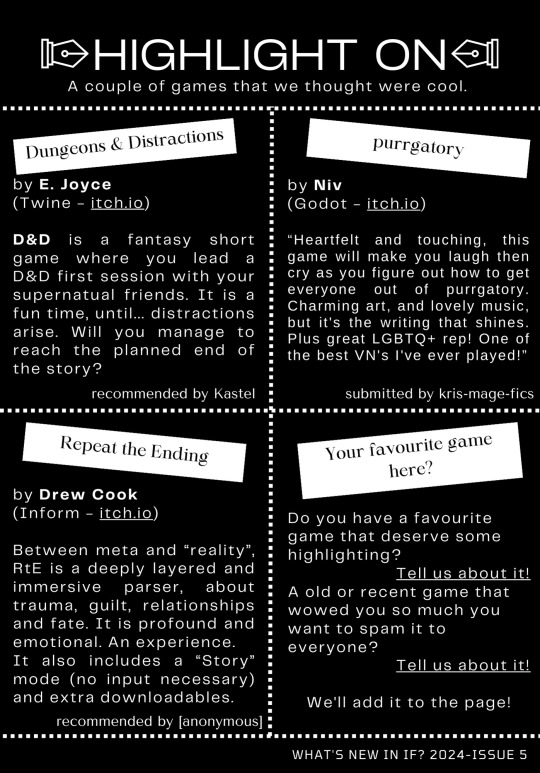
HIGHLIGHT ON...
A couple of games that we thought were cool.
Dungeons & Distractions by E. Joyce (Twine)
D&D is a fantasy short game where you lead a D&D first session with your supernatural friends. It is a fun time, until… distractions arise. Will you manage to reach the planned end of the story?
submitted by Kastel
purrgatory by Niv (@nivrad00 - Godot)
“Heartfelt and touching, this game will make you laugh then cry as you figure out how to get everyone out of purrgatory. Charming art, and lovely music, but it's the writing that shines. Plus great LGBTQ+ rep! One of the best VN's I've ever played!”
submitted by @kris-mage-fics
Repeat the Ending by Drew Cook (@golmac - Inform)
Between meta and “reality”, RtE is a deeply layered and immersive parser, about trauma, guilt, relationships and fate. It is profound and emotional. An experience.
It also includes a “Story” mode (no input necessary) and extra downloadables.
recommended by [anonymous]
Your favourite game here?
Do you have a favourite game that deserve some highlighting? Tell us about it! A old or recent game that wowed you so much you want to spam it to everyone? Tell us about it!
We'll add it to the page!
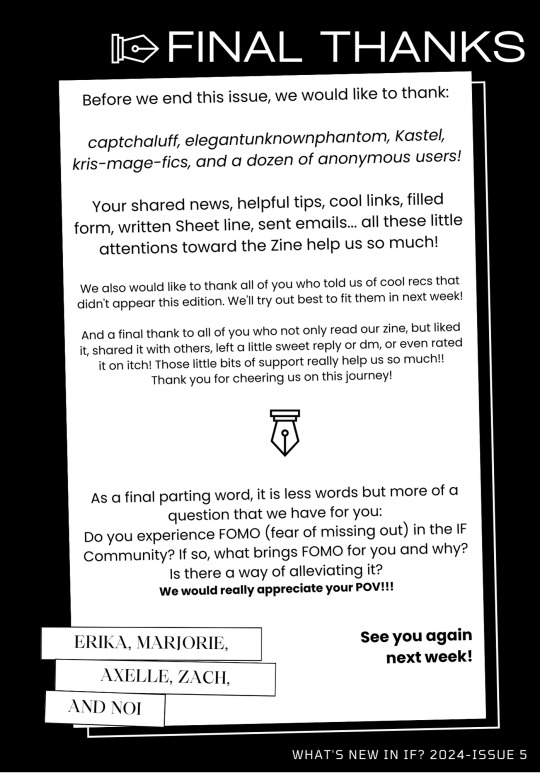
FINAL WORD
Before we end this issue, we would like to thank:
@captchaluff, @elegantunknownphantom, Kastel, @kris-mage-fics, and a dozen of anonymous users!
Your shared news, helpful tips, cool links, filled form, written Sheet line, sent emails… all these little attentions toward the Zine help us so much!
We also would like to thank all of you who told us of cool recs that didn't appear this edition. We'll try out best to fit them in next week!
And a final thank to all of you who not only read our zine, but liked it, shared it with others, left a little sweet reply or dm, or even rated it on itch! Those little bits of support really help us so much!! Thank you for cheering us on this journey!
~
As a final parting word, it is less words but more of a question that we have for you:
Do you experience FOMO (fear of missing out) in the IF Community? If so, what brings FOMO for you and why? Is there a way of alleviating it?
We would really appreciate your POV!!!
See you again next week!
ERIKA, MARJORIE, AXELLE, ZACH, AND NOI
WHAT'S NEW IN IF? 2024-ISSUE 5
#interactive fiction#if news#visual novel#parser#choice of games#choicescript#twine#ink#twine games#ink games#itch.io#interactive game#interactive novel#IF#games#hobby#indie dev#choose your own adventure#if-whats-new#What's New in IF#NEW ISSUE IS OUT!!
134 notes
·
View notes
Text
The 22nd Tenkaichi Budokai is a master class in setup and payoff.
We all know how tournament arcs go. The final round is going to be the arc's hero versus the arc's villain. Everything before that point exists to provide character work and spectacle moments, but there's rarely any ambiguity about where the tournament is going.
Poorly done, the lead-in matches can end up feeling like filler. Like the story's just spinning its wheels. Decently done, they give characters a chance to stand in a spotlight they wouldn't normally receive by the rest of the story, and let them shine in individual moments even if they aren't going the distance.
But a well-written tournament uses those lead-in matches to lay groundwork, planting seeds that will eventually sprout into the finale.

The final match of the 22nd Tenkaichi Budokai comes in hot. This tournament had previously been a sports movie arc about the rival schools of Kame-senryu or Turtle Style and Tsuru-senryu or Crane Style.
Ten thought he'd vanquished the star athlete of Kame-senryu, Yamcha, in the opening round. In fact, he rigged the ballots to ensure that he could face Yamcha right off the bat. But things took a turn when he found out that one of Yamcha's juniors, holy shit, killed his master's brother, a legendary assassin and a top-tier master of Tsuru-senryu.
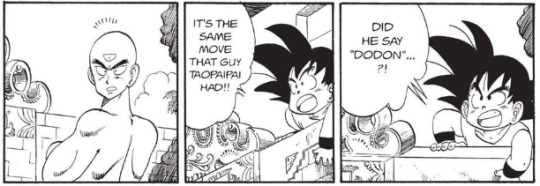

It's at this point that the story stops being about the school rivalry. Instead, it becomes a mission of avenging Tsuru-senryu's lost honor by vanquishing Taopaipai's killer. Ten isn't playing by tournament rules anymore; He wants to kill Goku in the ring.
Only. He doesn't, really. Locked in the fight of his life with Goku, Ten falls in love with the competitive atmosphere itself. He loses interest in avenging Taopaipai and becomes more enthralled by the prospect of simply proving his worth in the tournament itself.

It's at this point that the fight stops being about either of those things it was before. It's no longer a contest between Kame-senryu and Tsuru-senryu. Neither is it about revenge.
It's just about these two martial artists standing on the world stage, ambitions blazing as they reach for the lofty title of Strongest Under the Heavens. The only thing that matters anymore is the pure sport of it.

And what a sport it is. This fight is an incredible summation of everything that led into it. Throughout the arc, we get to watch Goku and Ten take each others' measure. We see the special care and attention they're paying to each others' matches, and we watch them grow from their own.
In Goku's semifinal match with Krillin, we see him break out an incredible vanishing technique.

Special attention is drawn to Ten's ability to follow Goku's movements, as he explains to the reader exactly what Goku is doing.

Setup.
By introducing this move here, we're ready for its faster-paced return in the final round - and we're already primed for Ten to counter it.
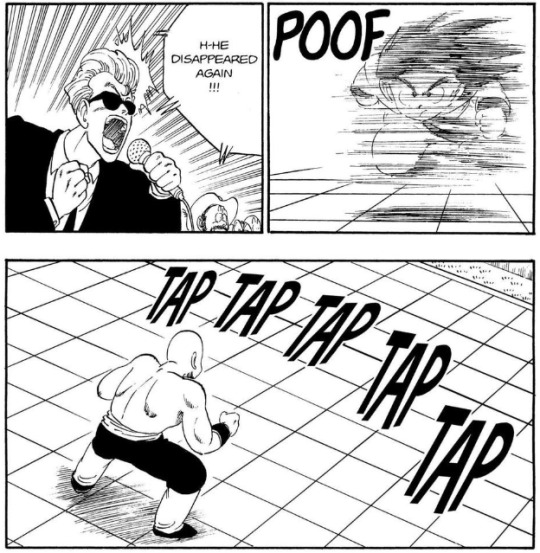
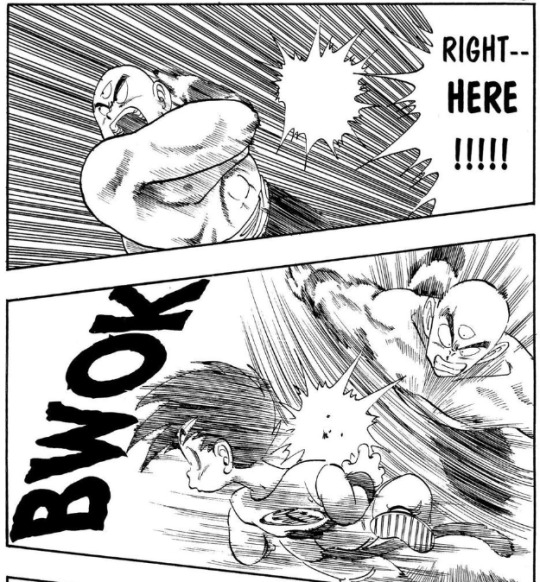
Payoff.
But Ten wasn't the only one paying attention during the semifinals. When Ten fought the Muten-Roshi in his guise of Jackie Chun, Goku got to see Ten's signature move: The Taiyoken or Solar Flare.
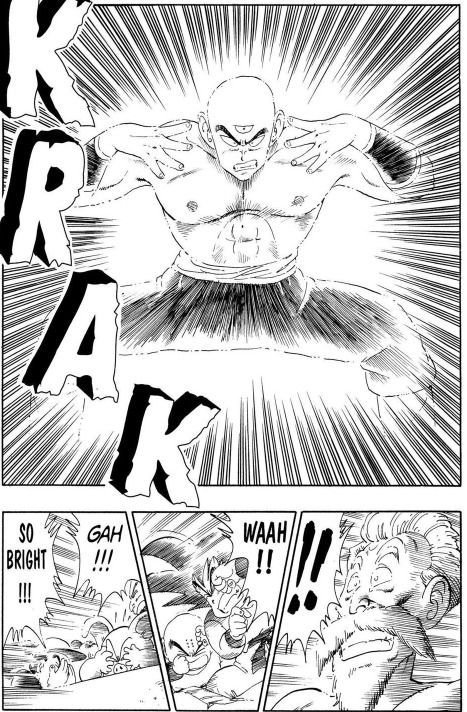
Incidentally, he refers to this as a Shin Tsuru-senryu or "New Crane School" technique, implying this isn't part of the standard Tsuru-senryu playbook; He created it on his own.
As with Goku's semifinal, getting to see Ten's semifinal gives Goku a leg up on the competition, as this advance preview of Ten's signature move gives him a chance to glean both how it works and how to counter it. We get to see Goku and Krillin discuss the limitations of Ten's technique.
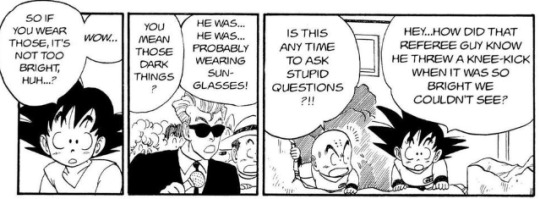
Setup.
This gives Goku the forewarning he needs to be ready for this technique when Ten breaks it out in their match.

Turning Ten's attempt to capitalize on Goku's blindness and vulnerability, into an opening for a counterattack - through a little bit of sneaky-handed filching.

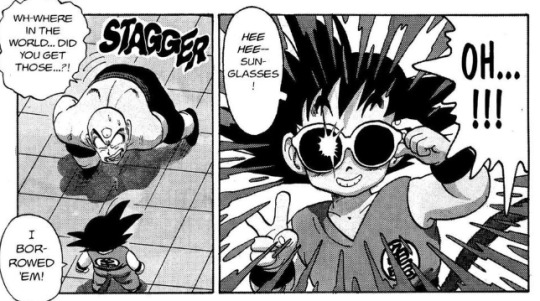
Payoff.
Neither of these guys is winning this tournament with the same tricks that carried them through the semifinal, that's for damn sure. But it's not only their matches that play into this finale. Krillin's fight in the quarterfinals with Chiaotzu - the only real fight Chiaotzu's ever had in this entire series - serves to establish Chiaotzu's psychic abilities.

Setup.
Chiaotzu can telekinetically bind a person, leaving them helpless to attack. It doesn't win him the match, but it briefly allows Tsuru-sennin to rig the finals in Ten's favor.

Payoff.
This ability, set up in the quarterfinals, is what gives Ten the opportunity to realize he doesn't feel right winning like this, and to choose fair competition and sportsmanship instead.
It's easy to keep focus on how Goku and Ten are feeling about this move, because we've already been introduced to the ability itself. What is happening here doesn't need to be freshly explained, allowing the pace of the fight to be maintained.
Speaking of strange abilities we don't need explained, the preliminary rounds of the tournament, typically an easy wash, have one character introduced with surprising gravitas.
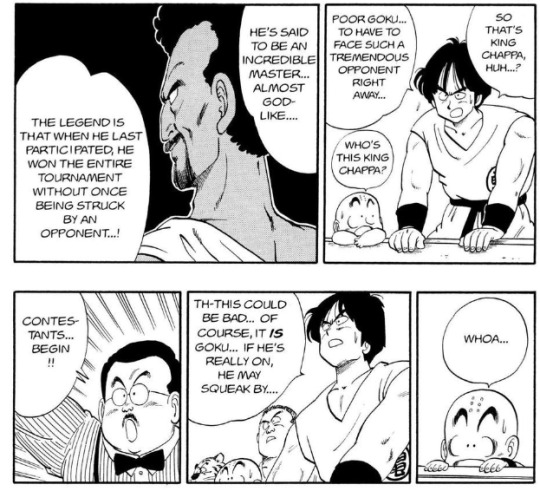
In the preliminaries, Goku faces King Chapa. One P, Viz. It's Chapa-O, named for the Italian dish chapati 'cause Toriyama likes his name puns.
Despite not happening on the world stage, this match is nonetheless treated as a serious tournament fight. Goku still wins the fight handily, but not before Chapa has a chance to show off his signature technique: The Hasshuken or 8-Armed Fist.

Hasshuken is a speed technique, built around moving your arms so quickly that it blurs visibility and creates the illusion that you have eight. Chapa hits Goku with this technique, but we see that Goku's fast enough to see through his moves and counter them anyway.
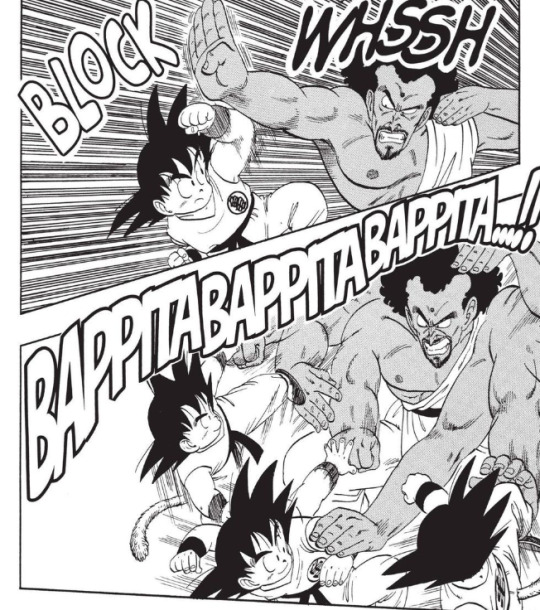
Setup.
In the finals, once he gets serious about competition, Tenshinhan unveils another esoteric ability: Shiyoken, the Four-Armed Fist.
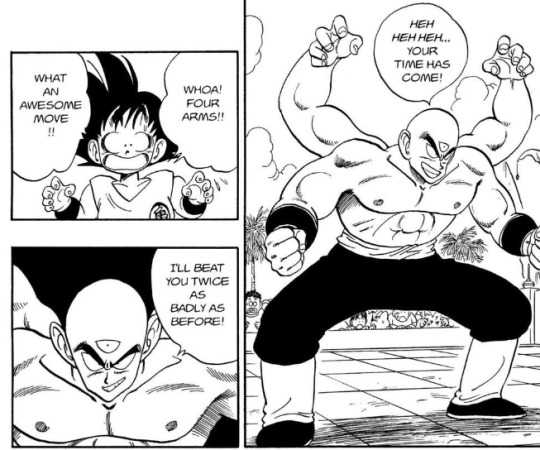
No optical illusion this time. Tenshinhan's devised an ability to physically sprout two extra arms to enhance his fighting.
But four arms are for suckers. Hasshuken can give you eight.


Payoff.
We've already seen Goku face down and defeat Hasshuken and we know he's a quick learner. So it's no surprise when he whips out the technique on his own, much later in the tournament, to counter Ten's Shiyoken.
Nearly every move of this final match stands on the shoulders of the material that came before it - Right down to the final blow. By this point, it's been long established that Ten and Chiaotzu can fly.
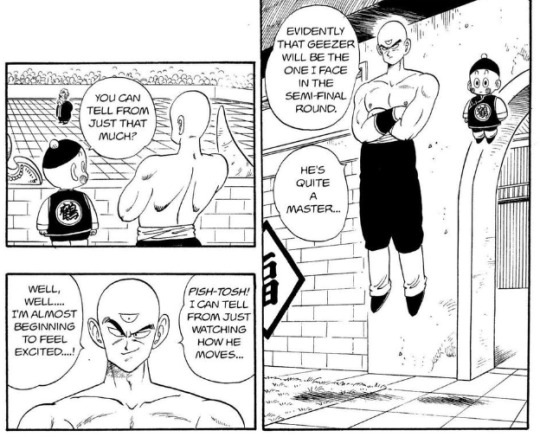
It may seem odd these days when everyone who is anyone has mastered it, but the levitation technique Bukujutsu was originally a signature technique for Tsuru-senryu. Everyone else cribbed it off of Ten.
They stole his Bukujutsu/Levitation. They stole his Taiyoken/Solar Flare. Fucking thieves, the lot of Kame-senryu. Turtles be stealin', yo.
In his desperation to win the finals, this becomes Ten's final ace in the hole. By destroying the tournament stage itself so there's nowhere to stand that isn't out-of-bounds, Ten can remain suspended in levitation and force Goku into a ringout.
The best Goku can do is take a huge jump, but that will only carry him so far. He needs to know Ten down to the ground before the ticking clock of gravity ends this match. He only has one option to reach with.
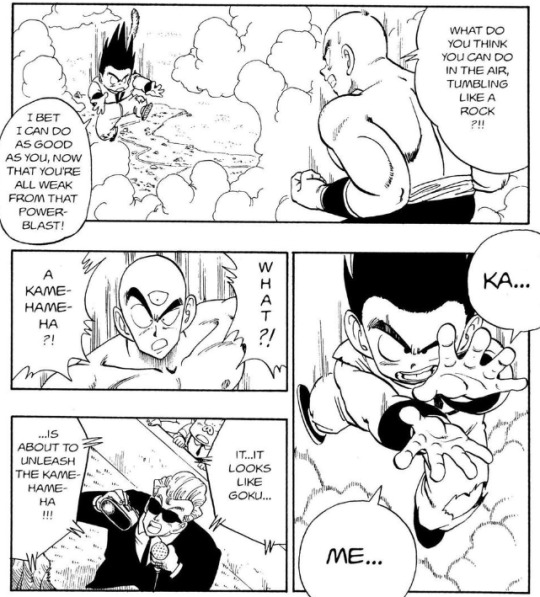
But it's useless.
During Ten's quarterfinal fight with Yamcha, it's established that Ten has the ability to cancel and reflect the Kamehameha.
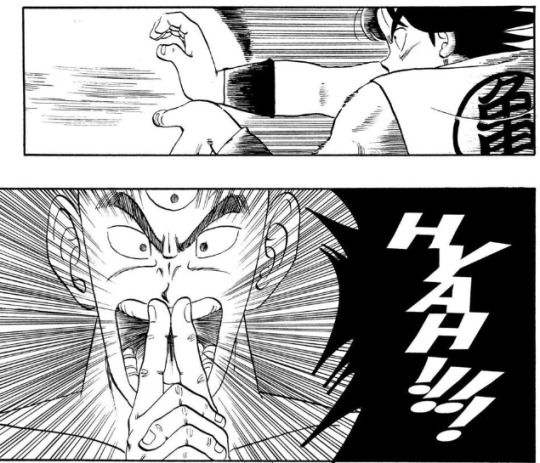
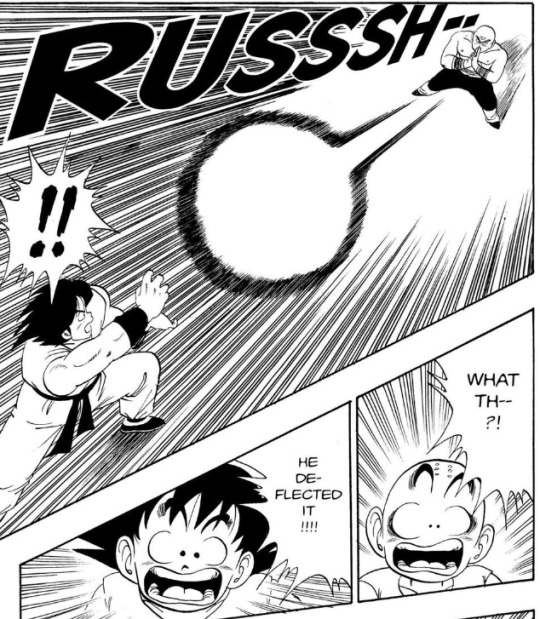
Setup
This was the first official fight of the tournament. It's a piece of context that has sat on the characters' shoulders for everything up to this point, and we even see Goku attempt a Kamehameha earlier in the final round before thinking better of it.
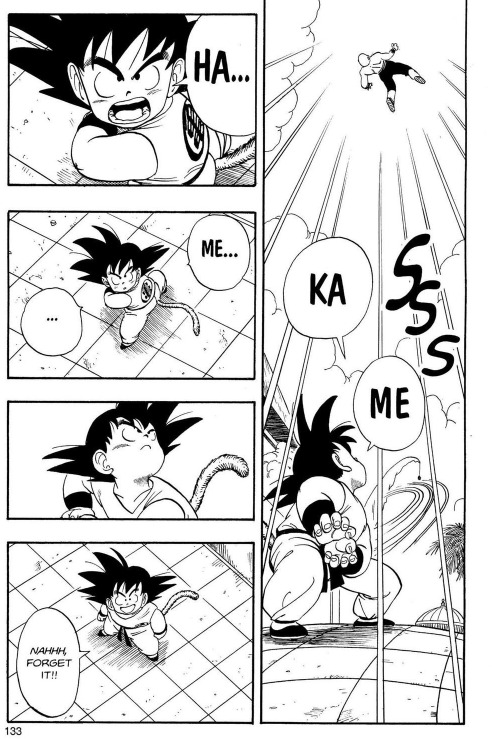
Payoff (Kinda)
He remembers that Ten can cancel his Kamehameha. It would be a waste of his energy to try for it. Instead, he saves his strength for the longer fight ahead.
This, in turn, is what makes it so suspenseful when Goku is forced to resort to it in this very last exchange. Having no other option, Goku is forced to fall back on a move that cannot work. The outcome of the tournament now depends on an attack proven to fail at the very start.
And then it hits.



Payoff (For Real). Deflect that, asshole.
Though Ten still wins the tournament by sheer dumb luck of Goku hitting the ground a second before he did, this is nonetheless a thrilling solution to a problem created by the opening match of the arc.
This is what the entire final round of the 22nd Tenkaichi Budokai is: A series of payoffs fired off in rapid succession to plot points and abilities and ideas that had been sprinkled throughout the entire arc to that point. A fast-paced frenzy of a fight that rarely needs to stop to explain itself because everything was already layered out in advance.
This is top-tier tournament writing, and anyone seeking to write a tournament arc would do well to study what it has to teach.
84 notes
·
View notes
Note
Been reading some of the silver age Batman stuff... Ouch. Reading that and reading canon Bruce?
Ugh, I wanna punch whoever decided they had to make him an edgelord to be 'realistic'.
The silver age plots are goofy and all, I know. WFA plots have a bit of a sitcom feel, I know.
And the modern comics do have a lot of really interesting storylines - like the Court of Owls, Luke's whole WAR arc- and a lot of really creepy awesome villains.
But the problem is the modern mainstream comics? I can barely get through one without wanting to punch Bruce - and occasionally others, but most commonly Bruce - in the face.
And it is tough to enjoy a plotline when the main character is a jerk, if you were first introduced to that main character as a good dad, a good friend.
I really want DC to do a reboot again - or at least start an Elseworlds comic - where they bring back good dad Bruce.
Bruce taking Dick or Jason or whichever Batkid to movies or amusement park? Bruce hanging out with Clark just chatting and being BFFs? Dick just leaving for college instead of getting kicked out at 16? Dick and Jason having a good relationship? Batfam who do mess up, but always try to set it right?
Gimme!
I can totally relate!
The first time I got introduced to the Batman franchise it was with the general outline of “vigilante trying to save people regardless of their past and wrongdoing” which, admittedly, may be a bit shallow as far as characterization is concerned, but damn when I started getting into the batfam fandom and the Robin history… I was stumped.
The early versions of Batman, his trademark characteristic, was that he cared about people. That despite his past trauma, he was still so intrinsically good and kind hearted. He adored children. He never considered anybody beyond saving.
I will never understand how the writers could move from that Batman image onto a version of him that would adopt a child only to later kick him out and then tell another he’s “not interested in teenage rebellion” because “I’m not your dad”. Or even canonically punching one of them in the face hard enough to knock a tooth out, completely unprovoked.
(Not to mention the whole beating Jason up so badly that Jason literally says “I’ve never seen you hit Joker that hard. And you hate him.”… or the batarang incident. Just… yeah.)
It’s just… jarring.
I totally agree with you that there are some very interesting plots (Court of Owls my beloved) but I don’t get how that translates to the writers making Bruce such a horrible dad or mentor. Like, it doesn’t add anything to the story except making the reader dislike him. And not much (if anything) would have changed if they’d at least made him a decent dad/father. At least that’s how I feel.
(Writers should take inspiration from Batman: City of Madness, because the way Bruce handled the scared kid in there… THAT’S what he’s supposed to be like!!!! A gentle yet fierce protector!!!!!!)
So in conclusion… good dad Bruce for the win!!!!! This jerky Bruce isn’t canon for me 😤 Silver Age let’s go 💚
97 notes
·
View notes
Text
Worm and other media that won't just let you shoot the Joker, part 1:
Worm comments on the structure of stories, especially superhero stories, in some interesting ways. There's a lot of stuff that happen in superhero comics for no real reason than that it needs to happen for the story to be interesting; a huge amount of Worm's worldbuilding is devoted to taking these things and making the fact that they have to happen an explicit in-setting constraint. For instance, superhero stories tend to have more powerful heroes face off against much more powerful villains than their less-powerful allies, to the point where it seems like super-powerful threats are coming to earth every few weeks just because it wouldn't be interesting to read that comic otherwise. It gets weirder when you compare what villains end up visiting the cities of uber-powerful heroes vs the cities of less powerful heroes: Gotham mostly just has to deal with serial killers while Metropolis is a magnet for evil gods. Worm plays with this by having the Endbringers exist only because the big hero needed something to fight in-text: it changes "powerful heroes need powerful villains or else it wouldn't be interesting" from a Doylist justification to a Watsonian one. Then there's the fact that so much of the horrible conflict in Earth Bet is explicitly caused by Gods making sure the powers they grant people lead to increased conflict, the fact that one of the most powerful characters does what she does because the plot path to victory says she needs to, etc.
But the big one is Jack Slash, and how he's only able to get away with his bullshit because he has plot armor as a secondary power. As WB says here, "Jack's a reconstruction of the Joker type character in the sense that you can't have such a character take such a high profile position in the setting, without having there be a cheat." The Joker and similar characters are only able to keep being relevant threats in their stories because the narrative bends to let them win and stops them from being killed. Jack Slash is only able to keep being a relevant threat because his power makes the universe bend to let him win in the same way. Not only does this make for an interesting obstacle (its almost like they're fighting an authorial mandate!), but it skewers the use of similar character's plot armor and how unrealistic and unsatisfying it makes their stories.
But wait, what does it mean for a story to be "unrealistic" in the context of superpowers? Is being unrealistic in those contexts actually a problem? For that matter, what does it mean for a narrative to bend to let someone win? Its not like there's an objective way fighting the Joker would go, which the author is deviating from by letting him survive.
[Stuff under readbelow contains spoilers fo, the movie Funny Games and the book Anybody Home?]
Maybe we could say that if characters like the Joker were real, and put in the situations they are in their stories, they would end up being killed really quickly. But is that a reasonable way to judge stories? A narrative where such a character is killed unceremoniously to satisfy a need for realism isn't any less an expression of the author's deliberate choices than a story where the character keeps showing back up to satisfy a desire for fan-favorite characters. And while Jack Slash's arcs help show why deviating from "realistic consequences" in the service of keeping a character alive can make a story exhausting and screw with an audiences' appreciation of stakes, it doesn't make a strong case against the concept of villains having plot armor in general. A story isn't necessarily worse just for being constructed to keep the villains alive—all stories are constructed, and sometimes being constructed that way makes for the best story.
That becomes more clear when you take the premise of Jack Slash as "killer who wins because the mechanics of the universe says so" and make clear just how much "the mechanics of the universe" really just means "the story". Which is how you get Peter and Paul from Funny Games.
I'd highly recommend watching Funny Games (though for the love of god check content warnings), as well as Patricia Taxxon's review of it that I'm cribbing a lot from here. But to summarize, Funny Games is a movie written and directed by Michael Haneke about a family's lakeside vacation being interrupted by the appearance of two murderous young men, who capture them in their own house and slowly torture and kill them off. At least, that's what it seems to be about initially. It marketed itself as a somewhat standard entry in the genres of torture porn and home invasion thrillers, and played itself straight as one for the majority of its runtime. But then one of the two villains of the pair, "Paul," starts talking to the audience.
It starts small: after crippling the family's father and revealing that he killed their dog, Paul has the wife look for its corpse outside. While giving her hints, he slowly turns back towards the camera and smirks, before turning back. In isolation, maybe it could be interpreted as Paul smirking at Peter, seeming to look out at the audience only because of clumsy blocking. But then it happens again. Paul tells the family, who are completely at their mercy at this point, that they're gonna bet that they'll all be dead within twelve hours. When the family refuses to take the bet, asking how they could hope to win it when he can clearly off them all whenever they wish, Paul turns towards the audience and asks "what do you think? Do you think they stand a chance? Well you're on their side aren't you. Who you betting on, eh?" The audience is being acknowledged; their role as someone invested in the story is being examined by the ones introducing the stakes.
youtube
But the biggest moment comes near the end, when the mother grabs the shotgun she's being threatened with and blasts Peter. Paul startles, grins, and then hurredly grabs a tv remote and presses rewind. The movie itself suddenly rewinds to right before the mother grabs the gun, and plays again with Paul grabbing the shotgun right before the mother reaches for it.
Its a truly incredible moment, in that its the perfect way to forcibly take away the audience's suspension of disbelief. It forces the audience to acknowledge that they're viewing a story, not something happening to a real family. After their moment of catharsis against the villains, Paul makes the confront the fact that the movie will end however the creators want it to, and if they want the villains to win they'll will regardless of how little sense it makes. Fuck you, we can go from being set in the normal world with normal rules to the villains traveling back in time with a tv remote, because a story does whatever its creators want. Haneke just decided to make that obvious in the most jarring way imaginable.
But maybe the best way to illustrate Funny Games effectiveness at this type of artful unveiling is comparing it to its less-effective imitators. I've recently finished Anybody Home?, a recently-published book by Michael J. Seidlinger. It has the conceit of being narrated by an unnamed mass-murderer, guiding a new killer in their first home invasion. I started reading it before I watched Funny Games, and even afterwards took a while to realize the unnamed narrator wasn’t just a pastiche of a Paul-like character but was actually supposed to be read as Paul himself. Seidlinger was having his book be a sort of unofficial sequel to Funny Games, narrated by its star. Once I realized, a lot of the books details suddenly clicked. The big one was the constant references to “the camera" and the idea of murder being a performance for an audience, one that needed to be fresh and original to make “the cults” enjoy it. Take these passages from page 77:
If it happened, it would perturb. It would create suspicion. It wouldn’t end up ruining the performance, and yet, it could have derailed our casing. The camera can have all it wants; either way, it’ll make it look better than it really was. It’ll strip away the cues and other planned orchestrations and it’ll show the action—the actuality of each scene, each suggestion…
This is a spectacle, above all. The craft pertains to keeping and maintaining a captive audience; behind the camera, you’ll never know how it happened—the trickery that made the impossible possible, the insanity so close to home. It is spectacle.
Through online activity, the son made it clear that something is happening at home, yet we cannot be certain if he has noticed the camera.
These all point to the idea that the murders are being viewed by an audience rather than just by intruders, that this is a performance for said audience's benefit more than anything else. But notably, it also reinforces the idea of these characters having an existence outside of the camera: the camera shows the action and "strips away" the cues behind it, the victims have a life outside the camera such that they could plausibly sense that the camera is now here. The victims are sometimes described as playing into their role, but always metaphorically; always as if normal people start acting like characters when put in certain circumstances. Whereas Funny Games posits that characters will behave however the author wants them to, denying the claim that stories are realistic simulations of hypothetical scenarios.
The whole thing is predicated on the idea that there needs to be a guide, that the villain of a home invader movie is really in danger of something going wrong. Paul/The narrator keeps giving directions on what needs to be double checked, what needs to X, and its completely against the spirit of the role Paul served in Funny Games. If something goes wrong for the villain they should just be able to rewind and do it over, because the story was written for them to succeed. Anybody Home? throws out Funny Games theme of the story being on rails, of the winner being whoever the author wants it to be and the events following whatever the author wanted rather than what would "really" happen. It throws out the whole idea that it’s all just a story, by supporting the idea that the characters have lives not captured by the camera—or more relevantly, not captured on-page.
Because Seidlinger using the language of film in a book leads to different things going on with the fourth wall. The way Funny Games and Anybody Home? make the camera explicit are just different, and the former does it much more interestingly than the latter. Seildinger’s characters aren’t looking back at the reader, the fourth wall is never actually breached. Funny Games has Paul look into the camera to address the audience, making clear how it’s a story being set up for the audience's benefit. Anybody Home? invokes the idea of a camera tracking everything home invaders do in general, having it be a third-party force that’s itself an unseen character contained within the story, observing the intruder's crime rather than the reader. Why is it still a camera, if we're in a book rather than a movie? A character in a book talking about a camera watching them does not convey any of the same meaning as a character in a movie suddenly looking into a camera and smirking at the audience!
By the end, you realize that this is caused in part by the book's bizarro take on how horror movies exist in this world. It reveals that in its setting, all horror movies are adaptations of real home invasions, which get recorded by unseen mysterious forces. Killers enter a home and enact violence, are filmed by some supernatural camera, the footage gets leaked to the public, and then the killers sell the rights to the work to studios. The events of SAW really happened, but the movie was just an adaptation. Funny Games really happened, but the Paul in the movies was just an actor playing the Paul narrating this book. The killer's victims eventually realize that they're "victims," but not in the sense that they realize their characters in a story, only in a sense that they realize they got sucked into their world's magical realism bullshit.
Ultimately, while the book does the same trick of being all about how horror stories are “for” us, it gets rid of all the tricks that made it work for Funny Games. It even strips it's in-universe version of what made it special; Funny Games is just another adaptation of a real home invasion. All the meta stuff that makes it interesting in its genre are just gestured at as aesthetics.
So what makes Jack Slash in Worm succeed where the killers in Anybody Home? fail? Both are constructed to be entertaining for a 3rd party who stand-in for but aren't actually the audience; the entities in Worm, the cults in Anybody Home?. But Jack Slash doesn't mix his metaphors. Worm may turn various real-life factors affecting a work into in-story mechanisms of the world in the same way Anybody Home? does. But it doesn't also base itself off a text that takes in-story mechanisms and breaks them to force the audience to see the various real-life factors affecting the work. In effect, WB pulls off a trick Seidlinger tries and fails because WB wasn't taking another metatexual story and stripping it of what made it interesting.
Though that introduces the question: can such meta-moves be mixed? Can you have a text where story conceits become explicit plot mechanics the characters are aware of, while also having characters really look at the camera and tell the audience that its all just a story? Can you actually sell it and make it something interesting?
There is one story that tries this. I don't know if it pulls it off, but it certainly makes a lot of interesting moves that create a fascinating whole. It even comments on the Joker in the same way Worm does, having a character who seemingly cant die because the roll they play in the story is too impor—
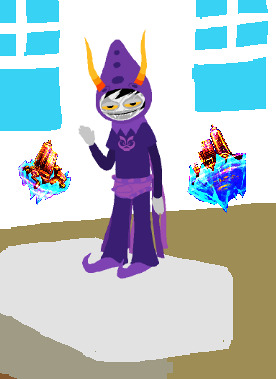
Ah fuck.
Continued in part 2.
#wormblr#wildbow#jack slash#parahumans#metafiction#funny games#michael haneke#anybody home?#michael j seidlinger#mals says#mals reads worm#Youtube
137 notes
·
View notes
Text
So I was reading a TCF reaction fic, I think it was Beginning of the End by who-stole-my-fries. And in that one of the Choi Hans, TCF Choi Han I think, was talking about what happened at Harris Village. And he said something like "I used to wonder how anyone could take another person's life. After that [the assassination of Harris Village], I realised how blind I'd been". Something along those lines.
What a line. What a line to have in a fanfiction. What a line to have Choi Han, the protagonist of The Birth of a Hero, the hero of a story and a hero in this world too, say. And it doesn't really matter which Choi Han said it, because it was referring to an event they both experienced, so we can assume that they both had this realisation.
This somewhat but not really links to an interesting theme among Cale and his friends and family. Because they are heroes, they're saving their world and other worlds and saving people. But none of them are completely pure or morally white. They all have, can and will do evil sadistic things to the people who hurt those they care about and put them in danger and they won't feel remorse for it. They have no qualms about killing or torturing or getting revenge. Because, yes, they're saving the world, but one of their main motivations, main reasons for doing this, is each other, to keep each other safe, to protect each other, to get revenge on behalf of each other. They only do those things to evil people, villains, but it's so interesting, because I feel like if you put them in other worlds, not their story but other stories, they'd be seen as vigilantes or even, in worlds with black and white morality, villains.
And I always think that's really cool. When a story doesn't have that black and white morality, when the heroes have to do "bad" thongs to win. Because really what's the alternative? They don't kill or torture people, they let them live, imprison them or something. Considering some of the villains are gods and others have special powers and abilities, that won't work. And these people aren't going to change their minds and suddenly abandon goals they've been working towards for decades and centuries. There is no alternative.
Or maybe there is. Realistically Venion could have simply been imprisoned, left with the knowledge that the brother he hates, the brother he thought he'd got rid of, had the position he always wanted as Marquis. But he tortured a child, a child dragon, but still a child. So is imprisonment punishment enough? I'd say no. Not for this. For abusing and torturing a child since they were born.
And that's one of the reasons I love these stories. Because there are so many stories where the villain is allowed to live at the end, hoping that justice, the system, will deal with them. But sometimes, sometimes revenge is understandable, sometimes the only way to stop the villain, is to kill them.
Choi Han wondered how anyone could kill another person. But then people came for his family, his friends everyone he knew and cared about, and he realised how blind he'd been.
Sorry, idk what this was. That one sentence or couple sentences from a fanfiction just stuck in my brain, not the exact words but the meaning. Ugh, god, I love TCF and I love fanfictions based on TCF.
#tcf#tcf novel#trash of the count's family#choi han#tcf fanfic#trash of the count's family fanfiction
107 notes
·
View notes
Note
You know, honestly the LoV should have won the Paranormal Liberation War and annihilated most of the Class 1A and the hero society as a whole. I didn't like Class 1A because nobody died and plot armor saved them too many times so I want the LoV to win in the PLF War Arc.
While I can't say I’m a big proponent to any of the kids dying, especially when they…used to be…the best chance the story had at changing things in the next generation. (Definitely should’ve killed more pro heroes though, especially Endeavor.) But that other stuff?
Yeah, yeah I think the first war should’ve ended in a far more decisive villain victory. Especially one where they get to be in charge a bit.

Like, people came away from the first war thinking the heroes lost, and certainly it was their worst showing of an operation in living memory. But did they lose? Certainly not. The villains lost over 99% of their forces including many of their power players that could’ve taken on pro heroes solo and won. Sure they picked up more later for the 2nd war, but most of these replacements were USJ-tier nobodies at best. Meanwhile the heroes only lost half their numbers...and most were just due to cold feat in the aftermath. Actual casualties were, as I recall, a few dozen or so? Maybe in the low hundreds?
And I think that’s quite a missed opportunity. I’d have loved to see what things could’ve been like with Shigaraki on his rubble throne; let the PLF put their money where their mouths were and make the easier-to-live-in world Toga kept talking about. I think it could’ve been a great way to show the flaws that were supposed to be in their approach, maybe see why things can’t get better through their kind of violent upheaval or what ways they aren’t equipped to govern; but maybe also highlight some more flaws in the existing system by having the PLF focus hard on fixing them or maybe fixing a few easily. Just one "man, why didn't we do that?" situation could've been really cool & interesting.
Instead we got a period where nobody was in charge…well, actually more accurately the heroes and their government were still in charge in theory, but they were doing it badly because they failed once so a bunch of people lost so much faith that they stopped listening and chose to live in localized effective anarchy instead. But then the heroes prove themselves again and it all went back to normal.
(Man, putting it like that makes the hero system seem like the stock market if it was law enforcement.)
Anyway, because we didn’t really get to see what the villains’ world would be like, I still kind of think a resolution where Shigaraki triumphed over everyone and came out on top as ruler would’ve been the 2nd best ending for everything we could’ve gotten. (1st was of course one where heroes and villains work together for a best of both worlds resolution. 3rd by a wide margin is the one we got where everything goes back to as it was and trucks along to doomsday. And 4th was the one where AFO pulls a win out his ass.) Because, considering how aware the PLF are of the existing system’s flaws and their want to correct them; I can’t think of much solid criticism for their hypothetical governance that are not themselves purely hypothetical worst-case assumptions. I mean, besides ‘it’s wrong to get there through such violence’…and this is a shonen action manga where All Might ushered in an age of peace after beating up enough of AFO’s goons. A message like that’d always read a little hollow.
I can’t help but think that’s not the impression I was supposed to get towards the idea of the League being in charge and trying to make their easier world, but it’s the one I got anyway because there's not much to disprove it. Whoops.
Besides, the Paranormal Liberation War arc really was the villains' arc; if anyone had earned a true win by the end, it was them.
#ask & reply#bnha#shigaraki tomura#toga himiko#paranormal liberation front#PLF#league of villains#lov#all might#hero society#anti endeavor#class 1a
48 notes
·
View notes
Text
Akio’s narrative and what it means to be “special”
Here's a bit of a rambly analysis I wrote about the concept of being "special" or "chosen" and what it means within the narrative of Revolutionary Girl Utena, as well as the biased framing of the narrative itself. It also became kind of a character analysis of Akio on accident.
General trigger warning for mentions of grooming, incest and victim blaming. Contains spoilers for the whole show.
In the world of Ohtori Academy, being “special” is synonymous with being a victim of Akio.
In episode 20, when Utena goes to Akio for advice regarding the situation with Wakaba, he reveals his philosophy about there being two kinds of people in the world: those who are special, and those who are not. He tells Utena that she is special, while implying that Wakaba is not. This is a textbook grooming tactic, making a kid feel special/important/mature/whatever in the eyes of an adult to gain their trust and emotionally distance them from their peers, but what I find interesting about this scene in hindsight is that the reason Utena is “special” in the first place is because of Akio. He’s the one who gave her the ring that made her part of the dueling game (part of the narrative), he and by extension Anthy are the ones who presumably manipulate the duels to give Utena the power of Dios that lets her win, and he’s the one who inspired her to become a prince, which is what makes her classmates view her as special too. In a way, Utena is a chosen one protagonist, but we come to realize that it’s only true in the sense that the villain has chosen her as his victim. Akio is not interested in Utena because she’s special, as he would like her to believe, but rather she becomes “special” because Akio has an interest in her — and had it since she was a vulnerable and impressionable child. (I believe that it was Akio who found her in the coffin, not Dios. Although I will also get to the idea that Dios might never have existed in a bit.)
What about the rest of the cast? Aside from Utena and Anthy, our main characters, the people who are designated as special by the narrative are the student council. The duelists who received their rings from End of the World. Again we have Akio deciding who gets to special within the world itself and within the story, and he is deliberately choosing people who are vulnerable, people who all have this fucked up idea about what love looks like. There is nothing special about them, really, apart from them being the exact kinds of people most vulnerable to being taken advantage of by Akio.
Of course this idea he has of people is a false one, but it does have a real impact on the social hierarchy of the school, how people perceive each other, and especially how people perceive themselves. The main example of this is Wakaba, whose duel is all about the frustration of being a side character, but really it extends to all of the Black Rose Duelists. They get their time in the spotlight, their focus episode. They get to be special, but like Akio says in episode 20, it’s only for a short time. It’s only as long as they’re useful to him. It makes sense why Wakaba is angry, and feels looked down on, but with this interpretation of what being special actually means for the characters in Utena, it is perhaps a good thing that she isn’t.
This viewpoint Akio has of the special and the non-special, and how much it frames the narrative of Utena, leads me to believe that the show, or at least a lot of it, can interpreted as being framed by him. The most direct example of this is episode 33, where many of the scenes are literally framed from his point of view, but I do think it extends to a lot of the narrative as a whole. It explains why Utena is the main character, since she’s the duelist whose abilities Akio is focused on cultivating throughout the plot. We find out in episode 13 that he has been watching her duel, and that he thinks there’s a chance she’ll make it to the final one. This implies that, at least symbolically, the first 12 episodes are him watching her to try to figure out her potential. He is not literally “behind the camera” as he is in episode 33, instead he has more of a director role. We know that he has some kind of semi-omniscient perspective of the school and what goes on in it, and I don’t think it’s too much of a stretch to say that that is what we are seeing when we watch the show, at least to an extent. It also explains why he is rarely obviously framed as the villain. We know he is because of the horrible things we see him do, and the show knows it too, but a lot of the time as he’s doing them, there’s a weird sort of cognitive dissonance between the between the framing/presentation of the scene and the horrifying contents of it, which makes it really unsettling. In particular I’m thinking of the weirdly upbeat and romantic music in episode 30. Akio’s grooming of Utena is often presented as this fairy tale-esque romance, because that’s how he wants her (and us?) to see it. Despite the sinister things going on in that episode, the only thing ever framed as such is Anthy. So let’s talk about her now.
The idea that the story of Utena is framed, directed and narrated by Akio really calls into question whether or not we can take his and Anthy’s backstory as presented at face value, and even aside from the symbolic and metaphorical nature of it, I really don’t think we can. I think Akio intentionally paints himself as a victim in it, someone who was once good but isn’t anymore because someone else (Anthy) made him that way. He has constructed this narrative where he is not at fault for anything he does, because his power to be good is literally locked away somewhere, when really, he could just stop being so fucking horrible.
I’m honestly inclined to take him at his word when he says “there never was a prince in this world to begin with” in episode 38. Dios never really existed, both in that the idea of The Prince (as well as The Princess and The Witch) is a constructed role and a metaphor, but also in that Akio was never a different person. He might have been kind once, but that wasn’t taken from him by anybody, he just grew up and he decided to hurt people. Did something tragic happen to him and Anthy to shape the cynical way he views the world? Absolutely. But it’s not an excuse he can use to justify everything like he tries to do. Several times throughout the show we see Akio pushing blame away from himself; he tells Anthy that it’s the world that’s hurting her, not him, in episode 37. In episode 38 he says she “enjoys being a witch.” And he’s not the only one to use Anthy as a scapegoat and blame her for things that aren’t her fault—this is something most characters do just as much as they project their desires onto her—but if he is framing the narrative this way, and that is what impacts the viewpoints of everyone else, then it does all circle back to him in the end.
I think part of him genuinely believes it too, that his own biased reframing of the story is the truth, and that this is how he copes with the guilt he feels for what he does. But of course the guilt is never stronger than his selfishness, which is why he never changes. And I think Anthy has internalized his version of these events as well, which is part of why she’s so trapped. She believes all of it is her fault, that he is the way he is because of her. This is not to say that Anthy is a blameless or innocent person, because she isn’t and she does hurt other people, but the idea that the abuse is somehow mutual between her and Akio or that they’re in any way on a level playing field in their relationship is simply not true. When he says his “Must you still torture me?” line in episode 34, that’s not some revealing insight into her having the upper hand the whole time, actually, it’s just him projecting his guilt and blaming her for his actions again. All she does in this scene to make him react like that is say “Good night, brother,” and to me it has always read as him being upset at being reminded of his role in all of this as the abuser. He cannot stand the fact that he is the one in the wrong here, and he has to make himself believe that Anthy is the one making him do it. Classic victim blaming in action here. It’s worth noting that she does look sinister when she smiles at him in this scene (and I imagine she does feel satisfaction at getting back at him in whatever tiny ways she can,) but again, if he frames the narrative, he is the one framing her that way in the first place. Anthy is not a witch. Not literally and certainly not within the symbolism and metaphor of the show. That’s a role Akio has cast her in. It’s a role she chooses to play as well, to an extent, but it’s questionable how much choice in the matter she really has.
All of this is why it’s so significant that the show ends when Anthy leaves Ohtori. When she leaves Akio. The narrative is Akio’s, and because Ohtori is Akio’s world, leaving it necessarily means leaving the narrative as well. Which is why we never see Utena and Anthy finding each other, or what is really outside the Academy — Akio’s perspective is just too limited for that, and it isn’t for him to see either.
I also just find it nice that their reunion and relationship doesn’t have to be a Story. They don’t have to be characters anymore, there doesn’t need to be any grand conflict beyond what is expected of being real people in the real world in a real relationship. They aren’t “special” anymore, and they’re not being watched. Not even by us.
(Here’s a fun little bonus about Nanami: I don’t believe every part of the show is framed and directed by Akio, and he certainly has no reason to care about all of Nanami’s silly side-plot shenanigans. So I like to think that all of the more comedic episodes are Anthy’s work. It’s already heavily implied that she’s the one pulling all these pranks on Nanami, and as insult to injury this is Anthy framing her in the most ridiculous way possible on purpose.)
#revolutionary girl utena#analysis#utena#anthy#akio#m#the narrative#all girls are like the rose bride#akio and utena#akio and anthy#utena and anthy
183 notes
·
View notes
Text
re: 405
This is gonna be long.
First, I'm bringing this post back around to remind people that kocchi is a pronoun of ambiguous plurality.
This means that an interpretation of "we" is just as correct as an interpretation of "I." Readers may interpret it differently, but on simply linguistic grounds, they are of equal validity.
You will often see this kind of ambiguous language used in Japanese, even with characters that are forthright. The reason is one part cultural expectation that the listener will read between the lines, and one part a willingness to accept two things as simultaneously true. This exists and is frequently found in English as well, there just isn't a direct parallel for kocchi itself.
What I want most out of writing this blog, aside from personal enjoyment, is for people to understand that there can be more to a story for you to engage with, think about, and be moved by, when you step outside the boundaries of your own language and culture.
I think that is a much more interesting space to be in than a gotcha-laden approach of trying to prove something wrong or bad.
But if we are going to talk accuracy, the fact is that the fan translation many people have been upholding as superior has just as many problems as the official one. It takes just as many creative liberties, they are simply different ones.
The fan translator centered an "I" reading and, rather than using either of the two pronouns provided by the text ("OFA" and あいつ, meaning "that guy"), added a narratively-charged word ("nerd") that did not exist in the original and which (as far as I can tell) Katsuki has never used when speaking to villains. As a translator myself, I really disagree with that second choice. The official clearly missed the callback, but noticed the theme of "everyone who has faced AFO until now" and went with "we." The rest was just style over substance which prioritized edgy language to capture the aggression of the line; this falls squarely in line with what Viz has consistently maintained as its in-house aesthetic. It's disappointing, but unsurprising to me.
Fandom oscillates pretty violently between vilifying the official English release and fawning over it. Whole fan theories are built upon nitty gritty bits of the official release's phrasing; people will get excited over how homoerotic a line sounds, and it's because of how the official translator worded it, rather than any innate implication in the original Japanese.
If you do not speak Japanese, your experience of MHA is fundamentally dependent on the work of translators. I respect that everybody has their personal tastes or hopes for how the series will go, but it is deeply demoralizing as a Japanese speaker and translator to see fans who don't speak any Japanese at all act as though their opinion has the same weight of authority as people who do.
You are entitled to your preferences, but please recognize that they are based in taste, not personal knowledge. Not all Japanese translators will even agree in their interpretations, but it weirds me out that some non-Japanese-speaking fans will use this fervor to spread misinformation far and wide that proclaims as inaccurate perfectly good official translations, simply because the choices don't suit their own tastes.
The lists of "times the fan translations were better" I've seen mostly contain instances where the fan translators took greater liberties than the official release did, and some fans just happened to like the liberties that were taken.
We all reasonably hated the "best friend" fan translation of chapter 359, but somehow that isn't a point forever against fan translations the same way mistakes in the official release are?
At this point, it makes me wonder what the point of writing about linguistic nuance is, if the interest is primarily not in learning but in being told what you want to hear.
I know posting this won't win me any favor with anybody, but it's how I feel. I'm bummed about 405's last line in the official. I do hope it gets revised. But the vibes around translation details are getting decidedly unfun.
One last thought: if you well and truly want to experience MHA unfiltered, learn Japanese. I mean this sincerely, I'm not trying to be a jerk. We live in an age where it is easier and more possible than ever to acquire a new language, talk to people around the world, and absorb yourself in culture and history.
If you want to remove middle-men and develop your own relationship with a work unfettered by the tastes, biases, or choices of others, learn the language. It won't be easy, but I can guarantee you won't regret broadening your horizons and discovering even more beautiful stories in the world.
143 notes
·
View notes
Text
i'm not sure how intentional this was but i do think there's something extremely poignant about how similar javier and alicia are to each other. especially in the context of their roles of the original story.
like. they're both sword prodigies, both extremely dedicated to being the best they can be, both reserved and unwilling to open up to others easily. and it's not often but sometimes their thoughts just,,, echo each other. and not like lloyd and javier's do, where they're both thinking the same thing but from opposite perspectives, no, they just both have very similar ways of thinking.
I am not afraid.
She wasn't confident that she would win. She didn't expect to. But it didn't matter to her. Even if she lost and perished, she vowed that she would at least buy enough time for her kingdom and people to be prepared to protect themselves.
That is why.
She walked toward the Bone Dragon once again without a moment of hesitation.
This is my duty
Failure. Death. None of it scared her. She instead glowered at the Bone Dragon with a calm gaze.
-Ch 217
Javier tightened his grip on the sword and turned around, swining the blade empowered by the remainder of his aura and his eight. It was significantly weaker than usual, but that did not matter.
Just once.
As long as he could deliver some kind of damage to the king of hell, there was hope for Javier; Lloyd could perhaps survive.
[...]
Javier bled from his left shoulder once again, as he readied himself to launch another strike. He turned pale and his movement slowed down. But the grandmaster did not stop.
Not yet.
It wasn't over. Lloyd was still unconscious. He had to buy him more time so his unruly master could get up and run away. That was his duty as knight.
-Ch 398
it's not that often and it's not that noticeable (mostly because there's a serious lack of alicia's pov compared to what we get of javier's but i digress) but i do think it's interesting.
and i think it makes sense when you take into account their roles in the original novel. javier as the protagonist, alicia as the antagonist, it makes sense their characters align in order to make parallels and contrast to each other.
i think it's a shame we don't really get to explore alicia's role as the villain in the original story beyond what little we get from the ending spoilers. nor the dynamic she would've had with javier as the hero. they, more than anyone else in the story, were made for each other. they, more than anyone else, should've been intrinsically linked to one another. but instead they're both just,,, around each other without ever quite touching. not truly. not in any significant way.
i dunno, i just think it was a missed opportunity to not have them develop their own relationship outside of their connection to lloyd. it would've helped to balance out the dynamics between the three and made alicia actually feel like a third protagonist rather than awkward love interest.
also i'm obsessed with the metanarrative of tged and it sucks that alicia's role as villain has almost nothing to do with the restoration of fate. if the role of protagonist is so important then the role of antagonist should've had at least an impact in the story rather than just being something to avoid!
#i talk a lot <3#tged#the greatest estate developer#alicia magentano#javier asrahan#love talking about things no one else cares about and/or understands truly i am returning to my roots <33#ch 217#ch 398
55 notes
·
View notes
Text
Having had time to process the Season 5 finale, and read people’s very interesting takes on it, my one remaining issue with it is…Adrien and Marinette’s character arcs.
Looking at Adrien first...he was on a journey, man. He started out so naïve and helpless, like this precious little bundle of light and joy who wanted to love everyone. You knew it wouldn’t last. You only hoped he retained that spirit even after he was broken...and you knew he’d break hard.
We watched him grow. Strike Back was huge. Season 5 was huge. We saw him speak up and try to take action. That fight with Gabriel in Representation? One of the best things in the show, in my opinion – what I’d been waiting for, for five seasons.
But what I’ve been saying for years is…I didn’t want him to be ‘saved’. I wanted him to save himself - with her support, of course. After all that growth, I didn’t want him to continue to be the damsel in distress. It doesn’t matter that it’s a boy being saved by a girl, this time. Sure, that turns tables, but it’s not enough. Boys shouldn’t need coddling any more than girls. I wanted partnership.
Maybe I built it up too much in my head. It doesn’t help that I wrote my own Season 5 before the TV version started airing. I guess it’s taking me some time to let go of my ideas and accept that none of it went remotely the way I expected. In a way…that’s a good thing. It’s good to be surprised. Just…
I wanted Adrien to face off with his father, knowing who he was. I wanted him to see his mother and learn the truth of it all. I wanted him to get that closure. I didn’t want everyone continuing to lie and keep him in the dark as if he’s still the same naïve, helpless, precious little bundle of light and joy he was at the start of the whole story.
I’m okay with Gabriel winning. I was actually hoping that would happen, because it’s a great idea. It was also such a Chekov’s gun – we had to see it happen, after all that teasing. Not to mention, there was no way they’d simply kill Gabriel or lock him away in prison, because both would have been too anticlimactic after all the drama. We needed something big and we got it.
I just wanted Adrien to be there for it. Not off-screen, locked in a room. And I know, I know, he took part in the battle in his own way, by having the self-awareness to remove his ring in order to save humanity and avert a Cat Blanc scenario. But Ladybug doesn’t even know what he did. She doesn’t know the extent of the part he played. She thinks she saved him. But he saved her, too…and everyone else in the world…and even he probably doesn’t realise that in full, because he doesn’t know just how bad it could have been, had he learned Monarch was his father.
Looking at Marinette…she has spent this whole show keeping secrets from people. Cat Noir really deserves to know about Cat Blanc - how much trouble has that secret caused? Now she’s keeping from Adrien the whole fact that his father was the villain, and that it all revolved around his mother. When is she going to learn that it’s not up to her to decide what someone should or shouldn’t know? That she doesn’t need to treat this boy like fragile porcelain? You cannot be in a relationship with someone where you treat them like a child. That’s called being his mother, not his girlfriend or partner.
Unless she doesn’t know. I keep coming back to this, in my mind. Maybe in this reality, she’s under the same delusions as Adrien and remembers things differently. Maybe she’s been duped into thinking Gabriel was a hero, too, because he changed everything for everyone in it, including her. If so…yeah, that’s really interesting…and horrible….
But I still wish Adrien had been there.
I just wanted him in the basement. Is that too much to ask for??? In Risk, we saw him pick up that eyepiece thing Felix left behind in the mansion. He pocketed it. He was meant to use it at some point, to find the spots on the painting and find the lift and find the basement. It never materialised, I think because they changed plans when the show got signed for more seasons. That scene was meant to happen and I can’t stand that it didn’t. I accept everything else. I just wanted him in that finale.
And as awesome as Marinette was, unifying the miraculous like no other holder before...it kind of showed that she could do the whole thing without him...and I’m not okay with that. She needs to know what he did.
So, now I’m back where I already was, waiting for everyone to realise he isn’t made of glass and he can stand on his own. Come on, Adrien, come on – show them all what we know you’re made of!
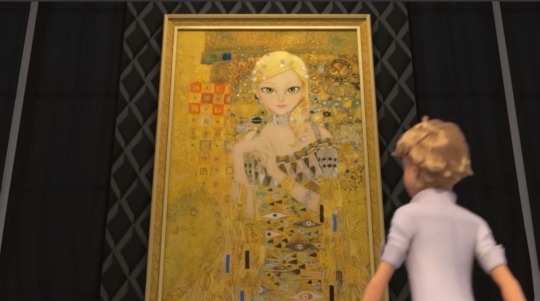
#ml meta#ml analysis#ml re-creation#ml recreation#ml spoilers#ml s5 spoilers#ml s5#ml adrien#adrien agreste#ml marinette#adrinette#adrienette#ml gabriel
215 notes
·
View notes
Text
If you're bored and got nothing to do, I got here some novels to read and recommend: (Action,Fantasy,Fam dynamics)
How to live as the enemy prince (discontinued because of the author passed away but the chances of ending happening comes within the manhwa adoption.)
Louts/Trash of the counts family (Book 1 complete with side stories. Book 2 currently ongoing. Manhwa ongoing with 3 seasons)
Omniscient reader's viewpoint (Main story completed. Side story ongoing. Manhwa ongoing)
The S classes that I raised (main story completed. Manhwa ongoing.)
What happens when the second male lead level up (ongoing as ar as I am aware of. Ongoing manhwa)
Duke! Please repent (Ongoing, Manhwa with 1 season, idk where the 2nd season is, I'm trying to find it)
Lord of mystery (Completed, manhua discontinued but will be animated by 2025 also this is a Chinese novel)
Return of mount Hua Sect (Ongoing. Mahwa ongoing with 2 seasons.)
Baby raising a devil (Completed. Also this one has romance in it aside from family building. Manhwa promo only)
If you got nothing to do and have alot of time just like me who is currently still on vacation bored af, here is some manhwa/manhua/manga to read: (Action)
Eleceed (Ongoing. My top manhua. Has no novel)
Lookism (Ongoing. No light novel as far as I'm aware of.)
Return of the mad demon (Ongoing 2?? Seasons or was it continues??)
Best Teacher Beak (Waiting for next season to be released on March??)
The Academy's undercover professor (Ongoing 2nd season, has a novel)
The greatest estate developer (Ongoing, has a novel)
Reborn rich (ongoing, not so sure but I think it has a novel?)
I'm not that kind of talent (Ongoing, has a novel)
Regressor Instruction Manual (ongoing, has a novel)
How to live as a villain (ongoing, has a novel?)
Doctor player (ongoing, has a novel)
Second life ranker (ongoing, has a novel.)
Solo Leveling (completed, has a novel with different plot, kind of but not entirely different the novel has romance in it while the manhwa only have it at the side story)
If you're bored and looking for romance manhwa/manhua/manga and novel here ya go:
For my derelict favourite (Ongoing, novel completed. My top on the list. Historical)
My in-laws are obsessed with me (Ongoing, has a novel but not translated. Historical)
His Majesty's proposal /A night with the Emperor (Completed. Historical)
Miss not-so sidekick (Completed. Historical)
Marry my husband (Completed. Modern)
Goodbye, in-law (Completed. Modern)
A bittersweet couple (Completed. Modern)
Positively yours (Completed. Modern)
I’m Only a Stepmother, But My Daughter is Just So Cute! (Ongoing. Has a novel but not translated. Historical)
The villainess turns the hourglass (Completed. Historical. Has a novel completed)
Villains are destined to die (Ongoing. Novel completed. Historical. Also my fav. Calisto for the win!)
Forget my husband, I'll go make money (Ongoing with 2nd season. Has a novel but not completely translated. Historical)
: I have read a lot of manhwa's manhua and manga as well as Chinese, Korean, Filipino and English novels. It doesn't mean that that aren't on the list that they don't deserve to be recommended. Once again I have read alot, but if I were to recommend stuffs, here are the list that came into mind. So if you're trying to find your personal fav, this is just my preference haha.
: I also barely included the famous ones like the sports manga, and some favous manhwa like WMMAP cuz those are just you know, they know about it for sure. Then again I included TCF and ORV on the novels because not everyone is really interested on reading long ass novel like jajdjskajhdiakjsjan I did not even include my BL list HHAHAHA
: If I'm not updating, I'm just reading, reread these stuffs. Bye.
74 notes
·
View notes